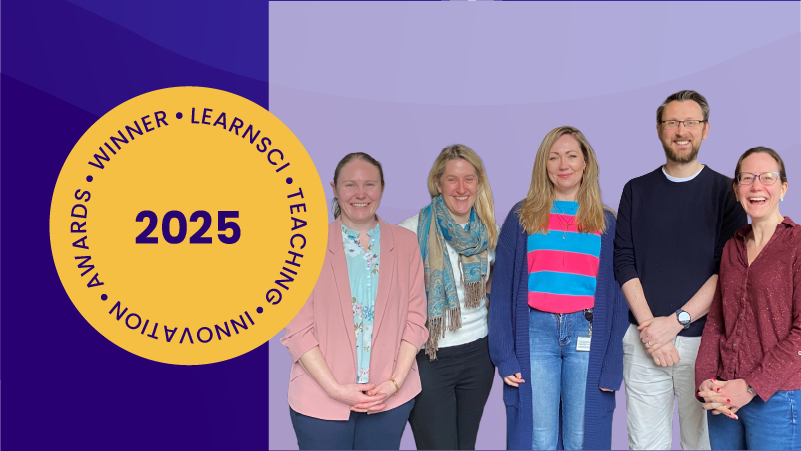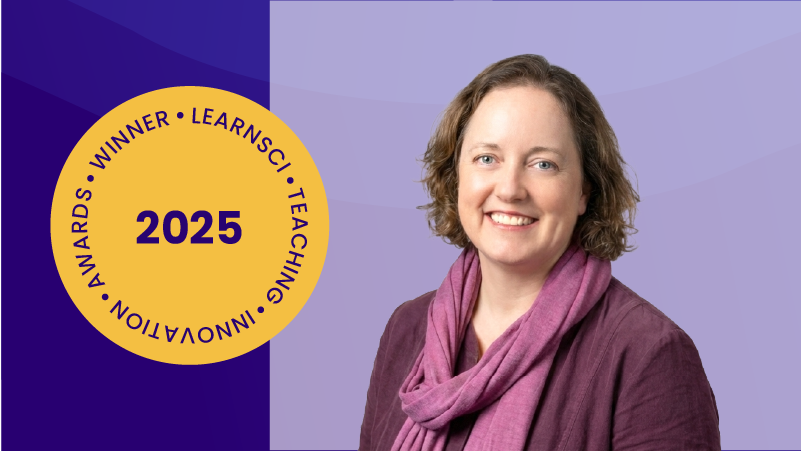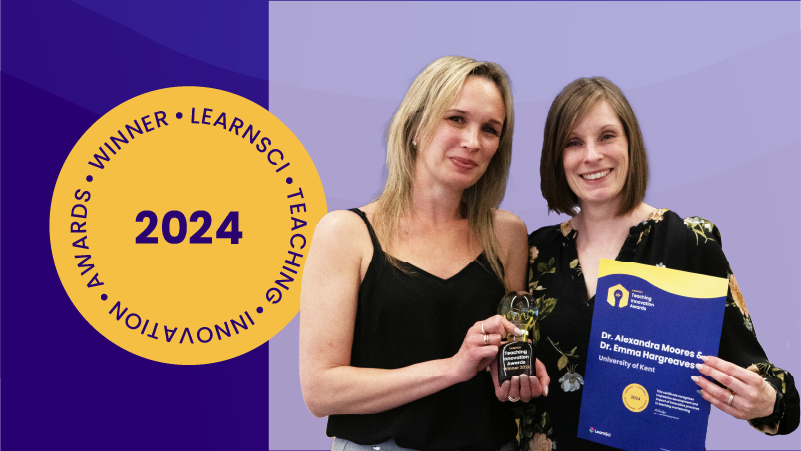
Learnsci Teaching Innocvation Awards 2023 Previous winners
Winners & finalists
Winners
Finalists
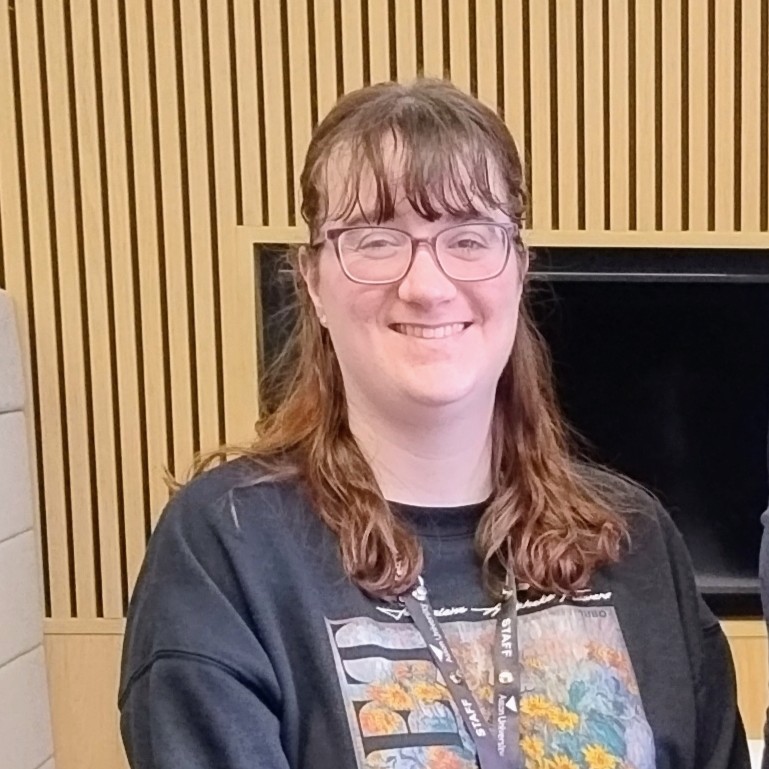
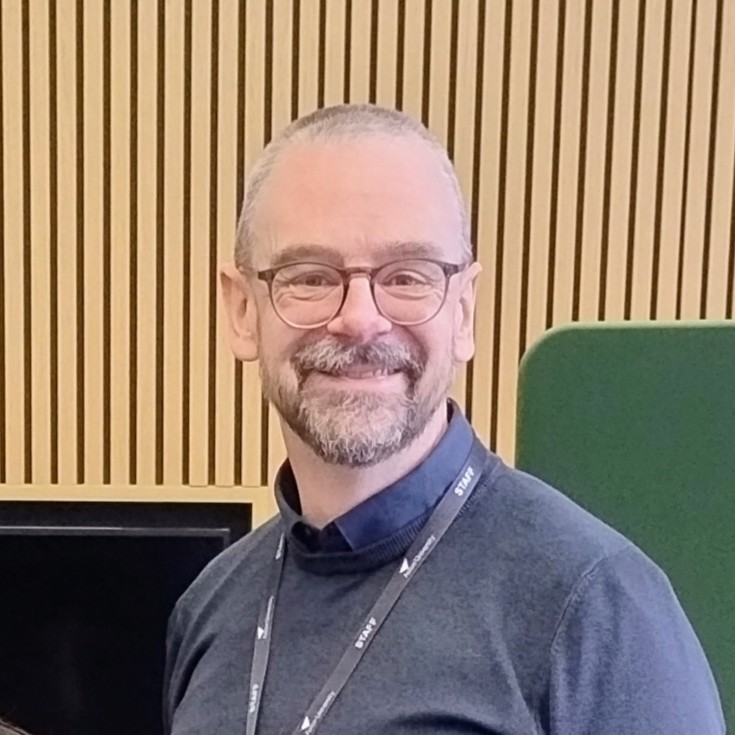
Many students feel anxious when answering professional phone calls, yet confident telephone communication is a core skill for Biomedical Scientists working in NHS laboratories. This technology-supported teaching innovation transforms how students develop this capability by using immersive online simulation tools to create a safe, practice environment. Through platforms such as Interview360 and the Blackboard VLEs AI Role-play tool, students engage in simulated laboratory telephone scenarios, record their responses, reflect on their performance, and receive structured feedback. This approach removes the fear of “getting it wrong” while promoting professional language, clarity, and confidence. Pre- and post-activity surveys evaluate learning impact, with students reporting increased confidence, reduced anxiety, and a stronger sense of readiness for clinical placement. Student feedback highlights the value of being able to practise “without pressure,” describing the activity as realistic, supportive, and directly relevant to NHS laboratory work.
Many students feel anxious when answering professional phone calls, yet confident telephone communication is a core skill for Biomedical Scientists working in NHS laboratories. This technology-supported teaching innovation transforms how students develop this capability by using immersive online simulation tools to create a safe, practice environment. Through platforms such as Interview360 and the Blackboard VLEs AI Role-play tool, students engage in simulated laboratory telephone scenarios, record their responses, reflect on their performance, and receive structured feedback. This approach removes the fear of “getting it wrong” while promoting professional language, clarity, and confidence. Pre- and post-activity surveys evaluate learning impact, with students reporting increased confidence, reduced anxiety, and a stronger sense of readiness for clinical placement. Student feedback highlights the value of being able to practise “without pressure,” describing the activity as realistic, supportive, and directly relevant to NHS laboratory work.
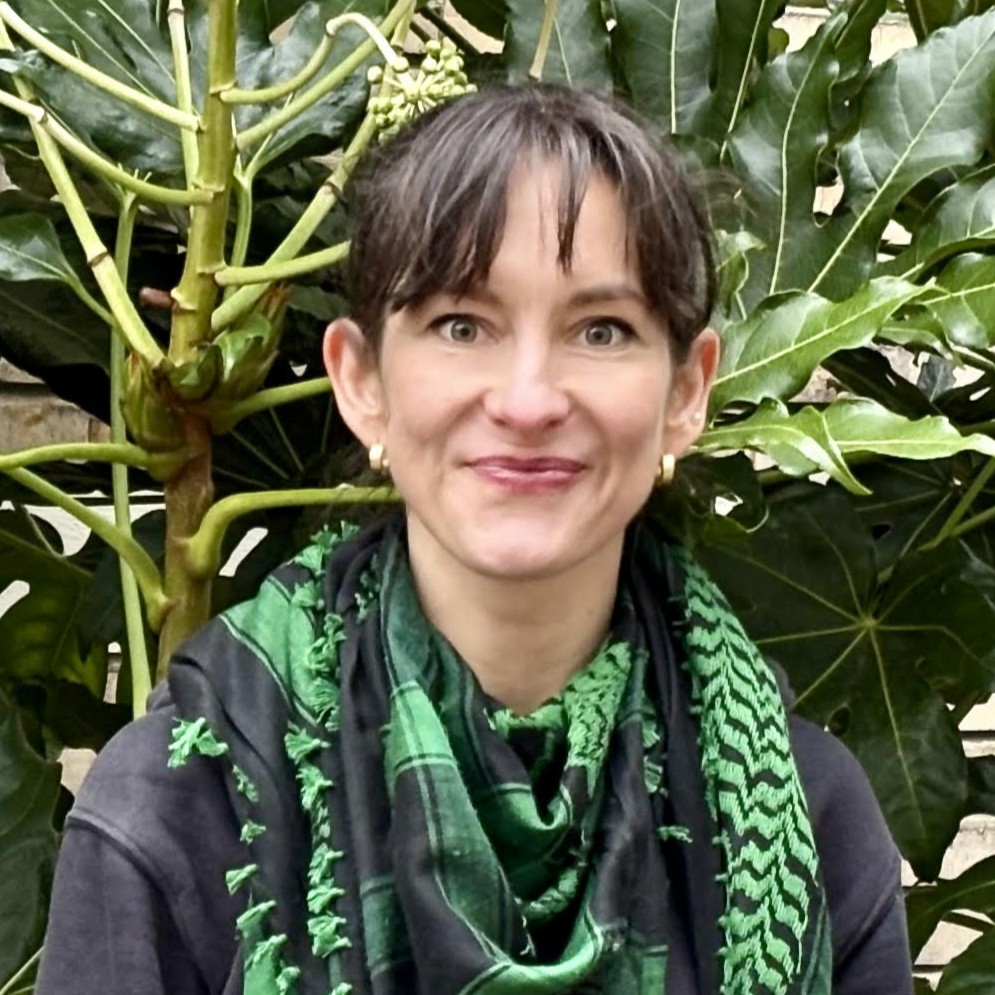
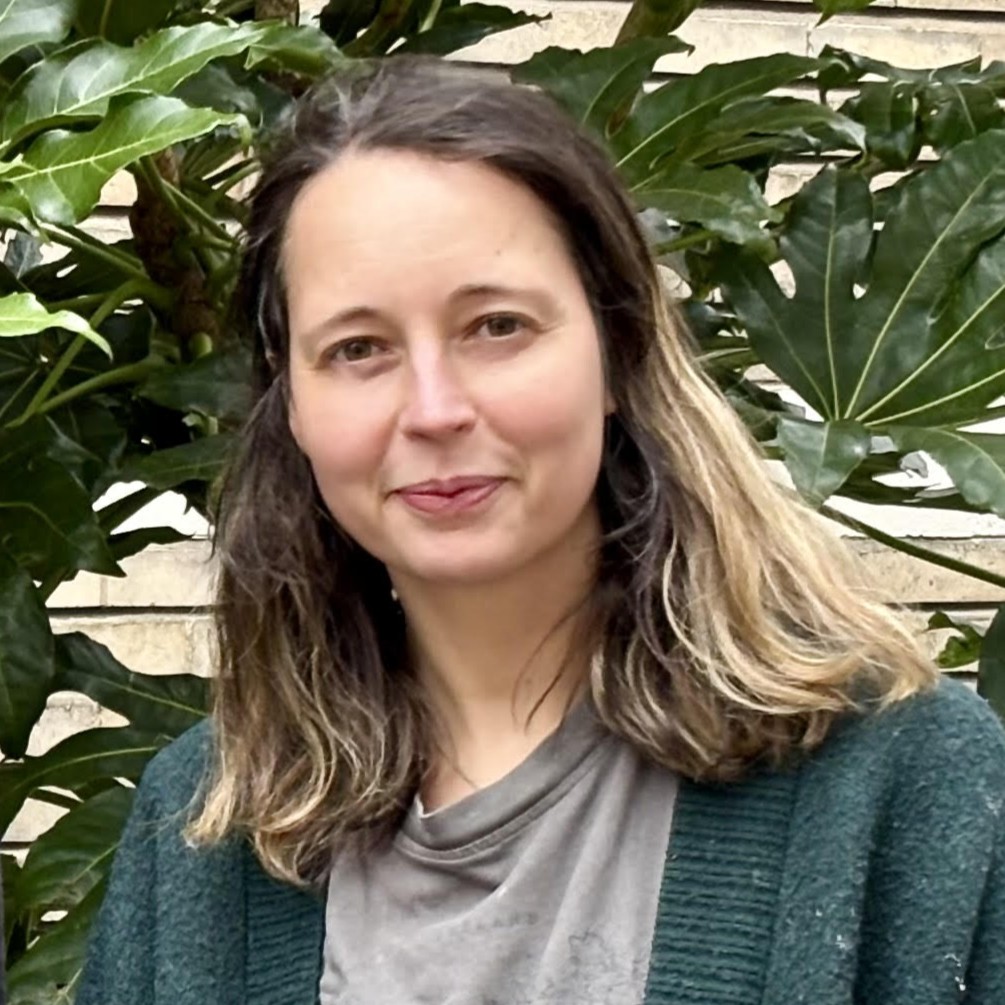
We co-designed, developed and now deliver the MOOC, "AI Ethics, Inclusion & Society" with University of Glasgow intern students. The MOOC is an innovative, evidence-informed approach to embedding AI ethical and digital literacy through a flexible, accessible higher education approach. The fully asynchronous course enables learners to critically examine societal, ethical, and environmental implications of AI. Since its launch in May 2025, the MOOC has enrolled over 1,100 learners, generated 30,000+ completed learning steps, and sustained 1,900 discussion contributions, evidencing active and reflective participation. Learner feedback highlights impact and quality, with 90% of learners gaining new knowledge and skills. While freely available beyond the university, the MOOC has also been incorporated as a credit-bearing component in Year 2 Chemistry and Engineering, with students' reflections including, "100% recommend this course to everyone". The MOOC’s sustainable delivery model also enables ongoing iteration in this dynamic field.
We co-designed, developed and now deliver the MOOC, "AI Ethics, Inclusion & Society" with University of Glasgow intern students. The MOOC is an innovative, evidence-informed approach to embedding AI ethical and digital literacy through a flexible, accessible higher education approach. The fully asynchronous course enables learners to critically examine societal, ethical, and environmental implications of AI. Since its launch in May 2025, the MOOC has enrolled over 1,100 learners, generated 30,000+ completed learning steps, and sustained 1,900 discussion contributions, evidencing active and reflective participation. Learner feedback highlights impact and quality, with 90% of learners gaining new knowledge and skills. While freely available beyond the university, the MOOC has also been incorporated as a credit-bearing component in Year 2 Chemistry and Engineering, with students' reflections including, "100% recommend this course to everyone". The MOOC’s sustainable delivery model also enables ongoing iteration in this dynamic field.


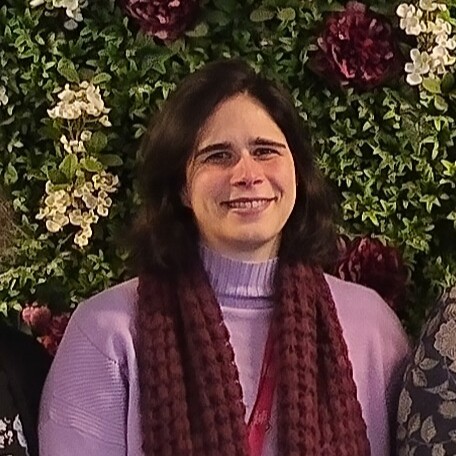
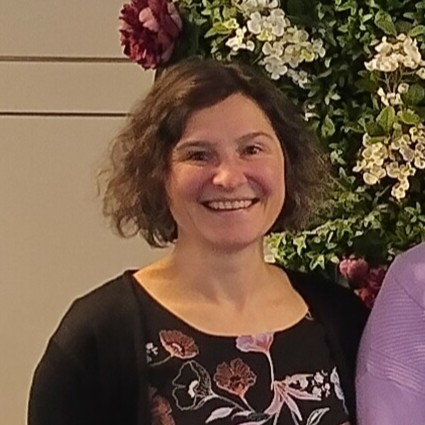

By reframing pre-laboratory work as core, accountable learning activities and integrating Smart Worksheets, we increased student skills acquisition without increasing academics’ assessment load. Noting low completion rates for pre-laboratory exercises that corresponded to decreased in-laboratory learning, we set out to increase the quantity and quality of engagement in our first-year cohort. We mapped Smart Worksheets from the LearnSci Library to 26 of 35 distinct laboratory sessions spanning five degree programmes, providing point-of-need skills scaffolding at scale. Completion of these worksheets, alongside the pre-existing exercises, became a portion of students’ laboratory attendance, leveraging institutional compliance structures to produce behavioural change. Completion rates rose five-fold, and laboratory staff reported increased student confidence, preparedness, and competence. There was a significant increase in mean laboratory test marks over the pre-innovation cohort (65±11% to 72±10%; p<0.05). Higher grades correlated with increased engagement with both types of exercises (p<0.05), demonstrating the strength of this integrated approach.
By reframing pre-laboratory work as core, accountable learning activities and integrating Smart Worksheets, we increased student skills acquisition without increasing academics’ assessment load. Noting low completion rates for pre-laboratory exercises that corresponded to decreased in-laboratory learning, we set out to increase the quantity and quality of engagement in our first-year cohort. We mapped Smart Worksheets from the LearnSci Library to 26 of 35 distinct laboratory sessions spanning five degree programmes, providing point-of-need skills scaffolding at scale. Completion of these worksheets, alongside the pre-existing exercises, became a portion of students’ laboratory attendance, leveraging institutional compliance structures to produce behavioural change. Completion rates rose five-fold, and laboratory staff reported increased student confidence, preparedness, and competence. There was a significant increase in mean laboratory test marks over the pre-innovation cohort (65±11% to 72±10%; p<0.05). Higher grades correlated with increased engagement with both types of exercises (p<0.05), demonstrating the strength of this integrated approach.


Our project harnesses learning analytics and digital simulation tools to transform bioscience teaching by strengthening student confidence, enhancing engagement and promoting skills mastery. By embedding digital worksheets and LabSims as compulsory formative checkpoints, we gathered detailed analytics on student performance patterns, allowing us to identify and address concept-specific bottlenecks in real time. This evidence-informed approach shifted our practice from broad content review to precision scaffolding, resulting in measurable learning gains (10–21% adjustments in worksheet scores) and a 15.6% rise in student confidence in laboratory, analytical, and numeracy skills. Students also reported stronger uptake for practical preparation and self-revision. This innovation addresses engagement, skills acquisition, efficiency, and accessibility of digital learning analytics, offering a scalable model for inclusive, data-informed bioscience education practice.
Our project harnesses learning analytics and digital simulation tools to transform bioscience teaching by strengthening student confidence, enhancing engagement and promoting skills mastery. By embedding digital worksheets and LabSims as compulsory formative checkpoints, we gathered detailed analytics on student performance patterns, allowing us to identify and address concept-specific bottlenecks in real time. This evidence-informed approach shifted our practice from broad content review to precision scaffolding, resulting in measurable learning gains (10–21% adjustments in worksheet scores) and a 15.6% rise in student confidence in laboratory, analytical, and numeracy skills. Students also reported stronger uptake for practical preparation and self-revision. This innovation addresses engagement, skills acquisition, efficiency, and accessibility of digital learning analytics, offering a scalable model for inclusive, data-informed bioscience education practice.

I have implemented a Smart Worksheet as a summative assessment on a core first-year undergraduate Life Sciences module with an intake of over 400 students. The ability to allocate different datasets to different students addressed concerns around collusion. Automated marking and feedback relieved us of over 100 hours of marking time, saving around £1500 and freeing up teaching assistants to support active learning sessions instead. The consistency of marking offered by the Worksheet also relieved over 12 hours of academic time previously spent re-marking and clarifying feedback. The real-time feedback provided by the Smart Worksheet encourages students to review their work and consolidate their understanding during the assessment; we recorded a resulting increase in student performance. Detailed reports on per-problem student performance allow us to reflect on our teaching practices, identifying key areas of the curriculum in which to prioritise support in future years.
I have implemented a Smart Worksheet as a summative assessment on a core first-year undergraduate Life Sciences module with an intake of over 400 students. The ability to allocate different datasets to different students addressed concerns around collusion. Automated marking and feedback relieved us of over 100 hours of marking time, saving around £1500 and freeing up teaching assistants to support active learning sessions instead. The consistency of marking offered by the Worksheet also relieved over 12 hours of academic time previously spent re-marking and clarifying feedback. The real-time feedback provided by the Smart Worksheet encourages students to review their work and consolidate their understanding during the assessment; we recorded a resulting increase in student performance. Detailed reports on per-problem student performance allow us to reflect on our teaching practices, identifying key areas of the curriculum in which to prioritise support in future years.

The University of Edinburgh's Chemistry 2 course introduced custom LearnSci Smart Worksheets to help students develop data analysis skills in a physical chemistry laboratory setting. These worksheets allowed students to practise working with their own experimental data, used personalised questions, and incorporated qualitative discussions. An evaluation via anonymous survey was performed. The students responded positively to the worksheets, finding them clear, easy to use, helpful in reducing stress, and improved their understanding of chemistry concepts and calculations. The worksheets also helped students to connect theoretical ideas with practical experiments and made it easier for them to manage their workload. The majority thought that similar worksheets should be used more widely in practical chemistry courses, but alongside lab reports, as they helped to build confidence and skills in a supportive way. LearnSci Analytics allowed worksheet submissions to be analysed, meaning targeted interventions in areas where students needed extra help could be provided.
The University of Edinburgh's Chemistry 2 course introduced custom LearnSci Smart Worksheets to help students develop data analysis skills in a physical chemistry laboratory setting. These worksheets allowed students to practise working with their own experimental data, used personalised questions, and incorporated qualitative discussions. An evaluation via anonymous survey was performed. The students responded positively to the worksheets, finding them clear, easy to use, helpful in reducing stress, and improved their understanding of chemistry concepts and calculations. The worksheets also helped students to connect theoretical ideas with practical experiments and made it easier for them to manage their workload. The majority thought that similar worksheets should be used more widely in practical chemistry courses, but alongside lab reports, as they helped to build confidence and skills in a supportive way. LearnSci Analytics allowed worksheet submissions to be analysed, meaning targeted interventions in areas where students needed extra help could be provided.

Quantitative skills are essential in Biomedical Science, yet students enter HE with increasingly diverse educational backgrounds, confidence levels and external commitments. Developed in collaboration with the IBMS, this project implemented five interactive, asynchronous Smart Worksheets to enhance engagement and support quantitative skills acquisition across the BSc Biomedical Science programme. Designed to be flexible and accessible, the resources provide personalised practise in numeracy, units, formulae, data visualisation and statistics within authentic biomedical contexts. Instant feedback, unlimited attempts and assessment alignment promote active engagement and measurable learning gain. Evaluation showed strong impact among those who engaged: 74.6% reported increased confidence and 73% reported greater module engagement. Importantly, engagement data also revealed why students did not engage. Students in higher-risk year groups were working the most hours, challenging assumptions that final year students need less support. The Smart Worksheets therefore function as an inclusive learning intervention and a mechanism for understanding engagement.
Quantitative skills are essential in Biomedical Science, yet students enter HE with increasingly diverse educational backgrounds, confidence levels and external commitments. Developed in collaboration with the IBMS, this project implemented five interactive, asynchronous Smart Worksheets to enhance engagement and support quantitative skills acquisition across the BSc Biomedical Science programme. Designed to be flexible and accessible, the resources provide personalised practise in numeracy, units, formulae, data visualisation and statistics within authentic biomedical contexts. Instant feedback, unlimited attempts and assessment alignment promote active engagement and measurable learning gain. Evaluation showed strong impact among those who engaged: 74.6% reported increased confidence and 73% reported greater module engagement. Importantly, engagement data also revealed why students did not engage. Students in higher-risk year groups were working the most hours, challenging assumptions that final year students need less support. The Smart Worksheets therefore function as an inclusive learning intervention and a mechanism for understanding engagement.
More fantastic examples of teaching innovation
This digital innovation focuses on the use of Virtual Reality (VR) learning environments in the Department of Chemistry and Faculty of Medicine and Dentistry at Queen Mary University of London, to improve student confidence and understanding when performing key technical skills or core competencies. The VR environment addresses existing challenges such as limited access to lab and clinical practice due to space, timetabling, and large cohort sizes. The innovation included the development of both a virtual chemistry lab and an Objective Structured Clinical Examination (OSCE) station for undergraduate students, which included self-assessment tools. This was developed through a student-staff partnership to ensure an authentic experience and maximised opportunities for meaningful learning. User feedback showed increased confidence and a perceived improved readiness for practical assessments. This digital tool demonstrates strong potential for wider adoption across STEM disciplines, offering a scalable and inclusive digital approach to enhancing the student learning experience.
Simulation software is excellent at providing contextual and sequence-building insight for teaching laboratory experimentation. However, it does not equip students with everything they require to succeed in an actual lab. We have developed hands-on lab skills sessions, and used these together with simulations and computer-based sessions to provide that extra level of competency to help our students excel technically and theoretically.
My teaching innovation integrates natural wastewater treatment systems into engineering education through experiential and project-based learning. Students design and evaluate nature-based solutions such as constructed wetlands, biofiltration, and hybrid treatment systems to address real industrial and municipal wastewater challenges. By combining field-based concepts, process modeling, and sustainability assessment, the approach strengthens students’ understanding of eco-engineering principles while aligning with outcome-based education and the UN Sustainable Development Goals. This initiative has enhanced student engagement, environmental awareness, and practical problem-solving skills, preparing graduates to implement low-cost, sustainable wastewater treatment solutions in resource-constrained settings.
We moved to video assessment to showcase practical skills and create a digital artefact for 3rd year forensic science students on forensic science and toxicology. Students were given the challenge of explaining and demonstrating forensic and analytical techniques in short videos, focusing on key points of the technique and communication skills to explain succinctly. Students ended the assessment with a digital artefact they can share at an interview or similar, to show what they can achieve in the lab.
I led an innovative project to co-create a comprehensive suite of digital learning materials for chemistry laboratory courses, including over 20 videos and quizzes. These resources, now embedded across all laboratory modules and supporting approximately 400 students annually, were so well-received that the collection was expanded beyond its original scope. To deliver this project, I secured competitive internal funding from Newcastle University, and managed a collaborative team comprising undergraduate students and my colleague, Dr. Zuleykha McMillan. This initiative embedded technology-enhanced learning, significantly improving accessibility for students with learning difficulties and diverse backgrounds, while strengthening staff-student partnerships through co-creation. The project’s impact extended beyond our institution: results were presented at national conferences, fostering collaboration with colleagues from other universities and leading to new joint initiatives in laboratory teaching.
Using a Smart PDF to generate unique datasets and redesigning the assessments in our Analytical Techniques of Biochemistry module has saved 66 hours of academic staff time and seen a minimum efficiency gain of 22.6%. Staff and student term-time workloads have also been decreased. We reduced coding time for generating unique datasets for the exam by using a Smart PDF. This uses an algorithm based on prime numbers and remainders to transform the original class dataset into unique datasets simply by students entering their 6-digit candidate number into the Smart PDF. Students no longer have to find their data file amongst their classmates' files; all students download the Smart PDF and exam paper simplifying the start of the exam.
To address a persistent skills gap among Level 4 (year 1) undergraduates, we developed a LearnSci Smart Worksheet that transforms health and safety training from passive induction into an active, decision-based skill acquisition. Traditional training relies on static documents and induction-style didactic teaching, often resulting in low engagement and poor knowledge transfer to the laboratory. Our innovation reframed Control of Substances Hazardous to Health (COSHH) and Risk Assessment as developmental practices. By shifting from memorisation to interactive problem-solving, we achieved a 100% completion rate, and analytics demonstrated measurable longitudinal improvement in COSHH assessment proficiency as students progressed through the activity. Furthermore, the self-marking, data-driven approach provided significant insight into learner comprehension. This allowed educators to identify and rectify specific misconceptions in real-time, addressing a traditionally overlooked area of the curriculum. This digital intervention ensures that critical safety competencies are not just documented but deeply embedded in student practice.
A series of innovative workshops have been developed to help students explore the potential and limitations of Generative AI in academic work, with a focus on scientific writing. The introductory session introduced key concepts such as prompt engineering, accuracy (including reference hallucination), and bias. Students then engaged in a series of hands-on activities including critiquing Generative-AI produced outputs and comparing to example student outputs, identifying limitations, discussing what constitutes ethical practice in the use of Generative-AI for academic work, and considering practical examples of how these tools can be used to support scientific writing. These workshops and the associated assessment have raised student awareness of best practice in using Generative-AI for academic work. This is one of the first substantial examples of empowering students to use Generative-AI tools in our subject and institution, and has been presented as an example of best practice at institutional level.
Introduction of fortnightly online-quizzes using a combination of LearnSci Smart Worksheets and multiple choice questions in an introductory chemistry course, to keep up student engagement, offer an important mode of feedback to students, and support deeper learning.
We developed a new first-year practical and professional skills module integrating LearnSci simulations, a PebblePad portfolio, and an Objective Structured Practical Examination (OSPE) to enhance STEM learning. This holistic pedagogical approach supports technical competence, professional development, and an individualised learning journey. LearnSci simulations provide scaffolded, interactive practice mapped to learning outcomes, ensuring safe, consistent skill acquisition before laboratory classes. A digital employability focussed PebblePad portfolio captures evidence of technical and professional growth through assessor lab skills sign offs, reflective blogs and tasks such as a Study Plan, Wellness Action Plan, Digital and AI literacy, delivered in collaboration with wider university services. The OSPE validates applied scientific skills creating a coherent “practice → evidence → performance” pipeline. Early feedback from this pilot shows strong engagement and confidence gains, with students praising the module’s focus on employability and holistic skill development.
First year undergraduate science students frequently enter laboratory classes with limited prior experience, leading to anxiety, reduced confidence, and inefficient use of teaching time. To address this challenge, I led the development and implementation of HotSpot Equipment Demonstrations (HEDs), a digitally enabled approach to laboratory preparation in a first year Human Genetics unit. Using ThingLink™, interactive equipment images with embedded explanatory text, video demonstrations, and safety guidance were provided to students one week prior to laboratory sessions and remained accessible throughout the semester. Student feedback and learning analytics demonstrate strong engagement and impact, with 96% of students reporting improved preparedness and confidence, and all respondents indicating enhanced learning. By reducing procedural uncertainty, the HEDs improved teaching efficiency and enabled greater focus on scientific reasoning, experimental practice and fostering deeper student-staff relationships. Successfully implemented across Perth and Sri Lankan cohorts, this scalable innovation demonstrates leadership in digital technology-enhanced STEM education.
In science Higher Education, most programming teaching follows a “syntax-first” approach: students are first taught the basics of programming, and only later is programming incorporated into science applications. This approach runs the risk that students don't see the relevance of learning programming until too late and disengage, missing out on valuable transferable skills and improved digital literacy. At the University of York I have introduced a “strategy-first” approach to teaching programming, beginning by exposing students to pre-written code which can be applied to relevant problems they have seen in other parts of their degree, and then breaking down the code into sections for students to understand, modify and improve. This ensures students make connections between programming and chemistry and produce outputs relevant to chemistry from their very first introduction to coding, which in turn boosts their confidence in programming.
Our team has led a technology-enhanced transformation of upper-level chemistry teaching by placing digital quantum molecular modelling at the heart of an active, collaborative learning experience. Recognising the abstract and mathematically demanding nature of quantum chemistry, we replaced traditional lectures with technology-rich applied workshops that use modelling software as a digital laboratory for exploring molecular structure, reactivity, and design. Confidence and motivation are built through scaffolded activities, beginning with accessible, creative chemical explorations and guided problem-solving tasks, and culminating in a capstone mini-research project in which student teams challenge themselves to design the fastest possible Diels–Alder reaction using the computer as a digital laboratory. These innovations have transformed student engagement, evidenced by enthusiastic feedback, sustained participation beyond class time, and strong self-reported gains in confidence and teamwork. Recognised through awards and peer-reviewed dissemination, our work demonstrates leadership in digital innovation that empowers students as active co-constructors of chemical knowledge.
The Virtual Flow Cytometer democratises access to advanced training in immunological research. Faced with increasing student enrolment and the restrictions imposed by the COVID-19 pandemic, we developed a browser-based simulator that replicates the complex decision-making of a real flow cytometer. Unlike passive learning resources, our tool allows students to manipulate controls, generate real-time data, and learn through safe failure. Originally designed to bridge the gap between theory and practice for our undergraduates, the toolkit has achieved global impact. It is now used by institutions across Europe and, through a partnership with the International Union of Immunological Societies (IUIS), provides free, gold-standard training to researchers in Low- and Low-Middle-Income Countries. This innovation has transformed a logistical barrier into an opportunity to advance global educational equity, ensuring that the next generation of immunologists can access high-quality training regardless of their location or funding.
This project represents a sustained teaching innovation that transforms interactive simulations from supplementary tools into authentic learning environments for undergraduate laboratory-based bioscience education. For over 13 years, I have addressed the persistent gap between theoretical instruction and professional laboratory practice by designing simulation-based environments that require students to generate, analyse, and interpret unique experimental data while making clinically relevant decisions. Underpinned by a published micro-model taxonomy, these environments replicate real diagnostic workflows such as enzyme kinetics and neutrophil chemotaxis, promoting independent reasoning rather than procedural compliance. The impact is substantial: historical failure rates in biochemistry practical assessments were eliminated, and immunology students with no prior laboratory experience achieved confidence levels equivalent to peers with previous hands-on exposure. By enabling unlimited, risk-free practice, this scalable approach improves equity, reduces anxiety, and ensures students enter physical laboratories better prepared, more confident, and capable of professional scientific reasoning.
UoScape is an open-access digital escape room platform created to make innovative, gamified learning widely accessible in higher education. Academics provide subject content, which is transformed into immersive 360-degree puzzle-based environments at no cost for both academics and users, enabling students to apply knowledge in realistic scenarios while developing problem-solving and teamwork skills. Since launching in December 2023, UoScape has enhanced learning for over 1,200 students and improved academic outcomes, including first-time pass rates, knowledge acquisition and student experience following its implementation. The platform is research-informed, with peer-reviewed publications evidencing positive student experiences and perceived knowledge gains. UoScape now spans multiple disciplines, is used by multiple partner universities across the UK, and has reached more than 33,600 users in 41 countries. Through international collaboration, outreach, and student co-creation, UoScape offers equitable access to gamified teaching innovation and is shaping the future of digital education.
This project presents a digitally enhanced, gamification-based approach to teaching pathology to fourth-year medical students. Because pathology is often taught in fragmented, system-based blocks, this innovation re-integrates essential concepts into a coherent workflow that follows the biopsy from acquisition to the final report. Digital tools, including Mentimeter polling, online bingo cards, digital microscopy images, and sequencing games, were used to increase engagement and support stepwise diagnostic reasoning. Students practised identifying biopsy types, reviewing slides, and interpreting pathology reports through interactive tasks. Survey data showed high satisfaction and improved perceived understanding of laboratory workflows and report interpretation. Gamified elements such as ‘pathology bingo’ and ‘diagnosis detective’ were described as enjoyable and effective for remembering key concepts. By combining digital participation tools with structured activities, this innovation created an engaging learning environment that supports essential diagnostic skills.
This teaching innovation reimagines ethics in biomedicine as an active, skills-focused learning experience that equips students to apply ethical principles confidently to real-world biomedical challenges. Drawing on six years of teaching experience and Senior Fellow HEA practice, the module integrates structured assignment workshops, seminar preparation sessions, and hands-on ethical simulations to support deep learning and constructive alignment with assessment. The approach has led to strong student achievement, improved quality of ethical reasoning, and sustained progression into postgraduate study across the UK. This innovation has now been embedded institutionally through the redevelopment of the module as part of Lancaster University’s Curriculum Transformation Programme, demonstrating both proven impact and long-term sustainability.
As Course Leader for the MSc Pharmacology and Biotechnology and Module Leader for Molecular Pharmacology and Biotechnology at Sheffield Hallam University, I developed a digitally-enhanced teaching approach that significantly improved engagement, skills acquisition, and accessibility for a predominantly international cohort. By embedding LearnSci videos, animations, and interactive resources directly into module content, I created a flexible, student-centred learning environment that supports diverse backgrounds and learning needs. These digital tools enabled students to repeatedly revisit complex concepts, prepare more effectively for laboratory classes, and build confidence in applying theoretical principles to practical work. The innovation addressed key barriers to understanding advanced scientific techniques and enhanced students’ digital literacy, autonomy, and preparedness for postgraduate research. Consistently positive student feedback and improved performance indicators demonstrate the strong impact and wider applicability of this approach across science-based curricula.
Our innovative teaching approach enhances nursing students’ engagement and skills in microbiology and genomic sciences, through digital tools and active learning. Key activities include using portable ATP devices for real-time surface cleanliness assessment, animated videos depicting foodborne pathogen scenarios, and 360-degree videos demonstrating microbiological techniques, all uploaded to Moodle for flexible, self-paced learning. Additionally, a student peer tutor program in genomic sciences fosters collaboration, leadership, and understanding through online forums and student-created animated and clinically relevant laboratory demonstration videos. These initiatives have positively impacted over 600 students by promoting critical thinking, digital literacy, and autonomous learning. The integration of e-learning multimedia and peer-led activities creates accessible and scalable learning environments. Overall, the project advances student-centered education, improves practical and theoretical knowledge, and aligns with contemporary digital and pedagogical standards.
ATSKILL is an AI-first framework designed to strengthen cognitive ability, agency, and creativity in technical and vocational education. Instead of using AI merely for automation, ATSKILL positions AI as a co-worker that guides learners through structured reasoning, hyper-personalised learning paths, and motivational nudges. Its multi-agent design (combining guided learning, adaptive practice, retrieval-augmented generation, and ethical governance) empowers students to take ownership of their learning while improving problem-solving, retention, and engagement. The framework has demonstrated measurable gains in learner motivation, autonomy, and innovation through a 100-day pilot involving full-time students, work-study diploma learners, and staff. With zero-trust safeguards, bias mitigation, and human-in-the-loop oversight, ATSKILL offers a scalable, responsible, and future-ready model for integrating AI across Technical and Vocational Education and Training and broader educational settings. It represents a transformative step towards democratising intelligence and enhancing human potential.
AMCRA (Agentic Multi-Modal Cognitive and Resilience AI) is a next-generation, AI-first framework that transforms how organisations monitor, predict, and enhance human performance. Integrating Large Language Models, Large Behavioural Models, and ANN/Vision-based validation, AMCRA fuses physiological, psychological, behavioural, and contextual data to deliver real-time, evidence-grounded insights. Its zero-trust, no-hallucination architecture ensures every prediction is validated, traceable, and ethically governed. Designed around AI democratisation, AMCRA shifts intelligence from centralised enterprise systems to individual users, empowering proactive wellness management, cognitive readiness assessment, and personalised productivity optimisation. Applications span defence, healthcare, and industrial environments, enabling predictive fatigue modelling, mission-ready assessments, worker safety monitoring, and adaptive task allocation. By embedding privacy safeguards, fairness checks, continuous learning, and responsible AI governance, AMCRA sets a new benchmark for human-centric, high-reliability AI systems: enhancing resilience, safety, and performance across mission-critical domains.
The PLISTEAM–ViRal Model (Project-Based Learning integrated with STEAM and Virtual Reality) transforms cosmetic chemistry learning through interactive, case-based simulations. In this innovation, students solve realistic formulation challenges such as customer complaints about lotion or cream instability by applying HLB (Hydrophilic–Lipophilic Balance) calculations and reformulating products within a Virtual Reality lab environment. This digital innovation bridges theoretical and practical learning, allowing students to test emulsifier systems, and receive real-time stability feedback. Through this model, students develop critical problem-solving, collaboration, and communication skills, while experiencing authentic Research and Development processes in a safe, engaging, and technology-enhanced setting. The PLISTEAM–ViRal innovation supports 21st-century learning and can be adapted across chemistry education to promote creativity, innovation, and meaningful STEM engagement.
This AI-First Blueprint for STEM Education project transforms traditional skills-based learning into adaptive, AI-powered systems thinking. Through agentic AI tools like ATSKILL and GenAISuccess, students engage in co-creation, ethical decision-making, and real-time simulations. The blueprint embeds personalisation, accessibility, and human-AI collaboration into every layer of teaching and learning. It has been deployed across Southeast Asia, supporting inclusive education for diverse learners, including special needs and aging workforces. By integrating governance-grade ethics, digital literacy, and lifelong learning pathways, the project prepares students for resilient, innovation-driven careers. This project has won multiple international awards and sets a new benchmark for ethical, scalable, and human-centered AI adoption in STEM education.
The 2024 Awards are focused on progression of previous Teaching Innovation Award applications.
Winners
Finalists



In 2021, we won our Teaching Innovation Award for implementing several of LearnSci’s Smart Worksheets that had been specifically customised for our students at LMU. We showed how introducing these worksheets contributed to eliminating attainment differentials, transforming the university experience for ethnic minority students and ameliorating degree awarding gaps. Since our win, we've continued to implement Smart Worksheets in analytical and physical chemistry modules and have introduced worksheets and simulations in first-year lab modules to better prepare students for practical work.
With funding from the RSC, we're continuing our partnership with LearnSci, focusing on using digital worksheets for mature student learners. These resources have significantly boosted pass rates (>90%), increased student engagement, and reduced the awarding gap (<10%), demonstrating the effectiveness of our approach. Student feedback has been invaluable, leading to adjustments that keep engagement high. We’ve added an interactive escape room practical to go alongside the unknown compound worksheet, enhancing teamwork and problem-solving skills. Alongside the Education for Social Justice and Careers Education Frameworks, the resources from LearnSci alongside industrial partner, Noclor, ensures student success and career readiness (BSc Chemistry average graduate outcomes for three years: 89%).
In 2021, we won our Teaching Innovation Award for implementing several of LearnSci’s Smart Worksheets that had been specifically customised for our students at LMU. We showed how introducing these worksheets contributed to eliminating attainment differentials, transforming the university experience for ethnic minority students and ameliorating degree awarding gaps. Since our win, we've continued to implement Smart Worksheets in analytical and physical chemistry modules and have introduced worksheets and simulations in first-year lab modules to better prepare students for practical work.
With funding from the RSC, we're continuing our partnership with LearnSci, focusing on using digital worksheets for mature student learners. These resources have significantly boosted pass rates (>90%), increased student engagement, and reduced the awarding gap (<10%), demonstrating the effectiveness of our approach. Student feedback has been invaluable, leading to adjustments that keep engagement high. We’ve added an interactive escape room practical to go alongside the unknown compound worksheet, enhancing teamwork and problem-solving skills. Alongside the Education for Social Justice and Careers Education Frameworks, the resources from LearnSci alongside industrial partner, Noclor, ensures student success and career readiness (BSc Chemistry average graduate outcomes for three years: 89%).


We are passionate about supporting the student learning experience, seeking to understand and address barriers within the chemistry lab environment, whilst aiming to reduce anxiety and improve confidence through the creation of interactive e-resources.
We identified several key issues that impact negatively on students transitioning into a laboratory environment, which led to the building of an online resource providing a virtual immersion in an undergraduate organic synthesis lab, available to students before they entered the laboratory. The virtual resource introduces students to the laboratory environment, the equipment and chemicals they will be using, and the various health and safety requirements of the practical.
Our research is yielding exciting new results and the University of Glasgow has awarded us funding, through a competitive scheme, to extend this work. We are now leading an e-resource creation focused on lab safety which will span all undergraduate laboratories, thus providing consistent guidance and training for all our chemistry students and staff. Uniquely, we have included our technical staff at the heart of this project to platform their expertise.
We are passionate about supporting the student learning experience, seeking to understand and address barriers within the chemistry lab environment, whilst aiming to reduce anxiety and improve confidence through the creation of interactive e-resources.
We identified several key issues that impact negatively on students transitioning into a laboratory environment, which led to the building of an online resource providing a virtual immersion in an undergraduate organic synthesis lab, available to students before they entered the laboratory. The virtual resource introduces students to the laboratory environment, the equipment and chemicals they will be using, and the various health and safety requirements of the practical.
Our research is yielding exciting new results and the University of Glasgow has awarded us funding, through a competitive scheme, to extend this work. We are now leading an e-resource creation focused on lab safety which will span all undergraduate laboratories, thus providing consistent guidance and training for all our chemistry students and staff. Uniquely, we have included our technical staff at the heart of this project to platform their expertise.


Our genetics Smart Worksheet was designed to support our undergraduates in learning and practising fundamental statistical analysis skills and principles, while also building their confidence in a summative assessment.
Students’ feedback suggests it has assisted in overcoming their “mathematical hesitancy” and promoted their confidence in statistical analysis of bioscience data. Subsequent feedback from academics teaching other courses also suggests these students are now applying their newly acquired statistical skills with confidence in other modules classes too.
This success has opened the possibility of a significant change in the teaching of statistics across the Medical School. A case has been made for students to learn the principles of statistics and perform the tests themselves, rather than rely on automated software.
The Smart Worksheet has also since been adapted to a formative assessment for our Masters programme, to address attainment gaps. This was the only approach to successfully identify students requiring early intervention and support, and all students surveyed agreed it improved their confidence and statistics skills.
Our genetics Smart Worksheet was designed to support our undergraduates in learning and practising fundamental statistical analysis skills and principles, while also building their confidence in a summative assessment.
Students’ feedback suggests it has assisted in overcoming their “mathematical hesitancy” and promoted their confidence in statistical analysis of bioscience data. Subsequent feedback from academics teaching other courses also suggests these students are now applying their newly acquired statistical skills with confidence in other modules classes too.
This success has opened the possibility of a significant change in the teaching of statistics across the Medical School. A case has been made for students to learn the principles of statistics and perform the tests themselves, rather than rely on automated software.
The Smart Worksheet has also since been adapted to a formative assessment for our Masters programme, to address attainment gaps. This was the only approach to successfully identify students requiring early intervention and support, and all students surveyed agreed it improved their confidence and statistics skills.
Winners
Finalists
Reality Bites is an immersive storytelling learning resource aiming to revolutionise nutrition education through Virtual Reality (VR). Combining VR with self-directed virtual journeys, students explore the human digestive system in an engaging narrative, transforming the traditional provision of dense, fact-based physiology content, into an interactive, student-centred experience. Spearheaded by a student-led development process, Reality Bites leverages cross-disciplinary expertise. Nutrition students created storyboards and computer science students converted them into VR scenarios. This collaboration resulted in a tool that nurtures highly sought skills like digital literacy and teamwork, whilst also being universally endorsed by students and nutrition experts as a engaging, memorable, and effective educational experience. Reality Bites not only augments science education at RMIT University but will broaden its educational impact through novel VR development frameworks and cross-institutional resource sharing. It signals a new era of digital learning that emphasises active engagement and creative innovations in higher education.
Reality Bites is an immersive storytelling learning resource aiming to revolutionise nutrition education through Virtual Reality (VR). Combining VR with self-directed virtual journeys, students explore the human digestive system in an engaging narrative, transforming the traditional provision of dense, fact-based physiology content, into an interactive, student-centred experience. Spearheaded by a student-led development process, Reality Bites leverages cross-disciplinary expertise. Nutrition students created storyboards and computer science students converted them into VR scenarios. This collaboration resulted in a tool that nurtures highly sought skills like digital literacy and teamwork, whilst also being universally endorsed by students and nutrition experts as a engaging, memorable, and effective educational experience. Reality Bites not only augments science education at RMIT University but will broaden its educational impact through novel VR development frameworks and cross-institutional resource sharing. It signals a new era of digital learning that emphasises active engagement and creative innovations in higher education.
#RemoteForensicCSI is a global science community with a membership from five continents, initiated by three National Teacher Fellows in a tri-institutional collaboration, during the Covid-19 pandemic. It was recognised that there was an evident science knowledge gap for academics (HE and FE) and professional trainers in the applied science remit of Criminal Justice education, with the rapid transition to online learning and the urgent requirements for relevant e-resources. #RemoteForensicCSI is distinctive in that it has innovated teaching and learning around the world, in three mechanisms: 1) in providing tools and methods in response to the pandemic challenge, 2) improving teaching materials and practices and 3) developing new digital learning resources. Additionally, this international community of practice provides peer support and continual professional development opportunities, which has translated to the wider science sector as an exemplar in innovative education.
#RemoteForensicCSI is a global science community with a membership from five continents, initiated by three National Teacher Fellows in a tri-institutional collaboration, during the Covid-19 pandemic. It was recognised that there was an evident science knowledge gap for academics (HE and FE) and professional trainers in the applied science remit of Criminal Justice education, with the rapid transition to online learning and the urgent requirements for relevant e-resources. #RemoteForensicCSI is distinctive in that it has innovated teaching and learning around the world, in three mechanisms: 1) in providing tools and methods in response to the pandemic challenge, 2) improving teaching materials and practices and 3) developing new digital learning resources. Additionally, this international community of practice provides peer support and continual professional development opportunities, which has translated to the wider science sector as an exemplar in innovative education.
Supporting students transitioning into Higher Education (HE) is vital for wellbeing and retention. While all students require transition support, groups underrepresented in HE are likely to benefit most. We worked with current students from underrepresented groups in HE from the University of East Anglia (UEA) School of Biological Sciences (BIO) to identify what would be useful for new students to experience ahead of starting university based on their own experiences and a cohort-wide survey. Our student interns co-created content for our resulting ‘Preparing for your Biology Studies’ module: a non-credit bearing Blackboard module developed for BIO Foundation and First Year students which includes innovative use of digital tools to support science education. Commencing two weeks before students’ campus arrival, continuing into Welcome Week, with occasional content released through the year, it focuses on supporting learning, studying and transition into HE. Making no assumptions about student prior knowledge, background or experiences, content should be particularly valuable to students underrepresented in HE, as project leads worked with current students from these groups to help identify content areas and co-design some resources. Institutional impact is demonstrated through other UEA schools adopting the resource.
Supporting students transitioning into Higher Education (HE) is vital for wellbeing and retention. While all students require transition support, groups underrepresented in HE are likely to benefit most. We worked with current students from underrepresented groups in HE from the University of East Anglia (UEA) School of Biological Sciences (BIO) to identify what would be useful for new students to experience ahead of starting university based on their own experiences and a cohort-wide survey. Our student interns co-created content for our resulting ‘Preparing for your Biology Studies’ module: a non-credit bearing Blackboard module developed for BIO Foundation and First Year students which includes innovative use of digital tools to support science education. Commencing two weeks before students’ campus arrival, continuing into Welcome Week, with occasional content released through the year, it focuses on supporting learning, studying and transition into HE. Making no assumptions about student prior knowledge, background or experiences, content should be particularly valuable to students underrepresented in HE, as project leads worked with current students from these groups to help identify content areas and co-design some resources. Institutional impact is demonstrated through other UEA schools adopting the resource.
The BSc (Hons) Biomedical Sciences (BMS) programme at Newcastle University Medicine Malaysia (NUMed) and Newcastle University U.K. (NCL) aim to equip students with key practical and professional research skills for their future career path. Commencing AY 20-21, to support student learning during the Covid-19 pandemic, a suite of linked online resources was introduced to support BMS laboratory practicals, including in-house videos of laboratory techniques, example data and LearnSci LabSims. In response to positive student feedback, the online resources were subsequently retained to support physical laboratory classes.
Student surveys confirmed both NCL and NUMed students used LabSims and other online resources to aid preparation for physical laboratory practicals, but indicated more frequent usage by NUMed students, and enhanced usage by students across both campuses who were less confident in their physical practical ability.
To provide deeper qualitative data on student perceptions on the expediency of supporting online resources and their overall practical and professional skills development, we propose to run focus groups at both campuses as the same cohorts commence Year 2 in AY 24-25 . We propose to use findings from this study to redevelop and further evaluate the online resources supporting NUMed/NCL practical skills modules in the BMS programme.
The BSc (Hons) Biomedical Sciences (BMS) programme at Newcastle University Medicine Malaysia (NUMed) and Newcastle University U.K. (NCL) aim to equip students with key practical and professional research skills for their future career path. Commencing AY 20-21, to support student learning during the Covid-19 pandemic, a suite of linked online resources was introduced to support BMS laboratory practicals, including in-house videos of laboratory techniques, example data and LearnSci LabSims. In response to positive student feedback, the online resources were subsequently retained to support physical laboratory classes.
Student surveys confirmed both NCL and NUMed students used LabSims and other online resources to aid preparation for physical laboratory practicals, but indicated more frequent usage by NUMed students, and enhanced usage by students across both campuses who were less confident in their physical practical ability.
To provide deeper qualitative data on student perceptions on the expediency of supporting online resources and their overall practical and professional skills development, we propose to run focus groups at both campuses as the same cohorts commence Year 2 in AY 24-25 . We propose to use findings from this study to redevelop and further evaluate the online resources supporting NUMed/NCL practical skills modules in the BMS programme.
Module MD4010 Professional Skills for Life Sciences I, at the University of Chester, aims to introduce and develop skills relevant to life science students, including the development of practical and data analysis skills. The previous module assessment faced challenges which included: lack of structure leading to students feeling overwhelmed, inconsistencies in feedback and delayed release of provisional marks/feedback due to increased student numbers, and staff workload. To address these issues, an innovative summative assessment Smart Worksheet was implemented into the module. Part A consists of a number of tasks allowing microscopy and scientific drawing skills to be assessed outside of the laboratory. The module leader provided microscopy images and scientific drawings which were digitally transformed by LearnSci, to ensure a distinctive set for each student. Instant feedback opportunities allowed for immediate skill development and adjustment. Part B involves step-wise calculations, breaking down calculations into manageable steps. Early evaluation of the impact reveals improved student achievement (average mark increased from 77% (2022/23) to 85% (2023/24), with 92% of students achieving a mark exceeding 70% (2023/24)), enhanced student learning, elimination of academic conduct issues and enhanced student satisfaction and staff wellbeing.
Module MD4010 Professional Skills for Life Sciences I, at the University of Chester, aims to introduce and develop skills relevant to life science students, including the development of practical and data analysis skills. The previous module assessment faced challenges which included: lack of structure leading to students feeling overwhelmed, inconsistencies in feedback and delayed release of provisional marks/feedback due to increased student numbers, and staff workload. To address these issues, an innovative summative assessment Smart Worksheet was implemented into the module. Part A consists of a number of tasks allowing microscopy and scientific drawing skills to be assessed outside of the laboratory. The module leader provided microscopy images and scientific drawings which were digitally transformed by LearnSci, to ensure a distinctive set for each student. Instant feedback opportunities allowed for immediate skill development and adjustment. Part B involves step-wise calculations, breaking down calculations into manageable steps. Early evaluation of the impact reveals improved student achievement (average mark increased from 77% (2022/23) to 85% (2023/24), with 92% of students achieving a mark exceeding 70% (2023/24)), enhanced student learning, elimination of academic conduct issues and enhanced student satisfaction and staff wellbeing.
At the University of Surrey, an early intervention framework has been designed and implemented to support students’ mathematical development in the transition to undergraduate Science, Technology, Engineering and Mathematics degree programmes. Based on our Virtual Learning Environment, the framework facilitates a process of pre-entry preparation and self-evaluation for new students. Students who find mathematics challenging are identified and referred to focused in-semester tutorial sessions from the semester outset. Their progress can be monitored through engagement with further online diagnostics. The diagnostic process is primarily delivered digitally but the emphasis shifts toward more focused individual support in the intervention stage, where students can attend focused additional tutorials. The stages of the process are summarised as follows; (1) complete initial review questions (2) identify areas for improvement and review specific learning objectives (3) complete departmental diagnostic quiz (4) attend additional tutorial sessions. Stages (1)-(3) are completed prior to course commencement. Around 600 students (90% of our new intake in the Faculty of Engineering and Physical Sciences) voluntarily engage with the pre-entry initial review and diagnostics process each year. Performance data from the framework and feedback from students indicates that the process has a positive impact in three important areas; (1) enhancing performance/development (2) student experience (3) perceived level of mathematical preparedness – typically this improves by 14% after initial diagnostic process.
At the University of Surrey, an early intervention framework has been designed and implemented to support students’ mathematical development in the transition to undergraduate Science, Technology, Engineering and Mathematics degree programmes. Based on our Virtual Learning Environment, the framework facilitates a process of pre-entry preparation and self-evaluation for new students. Students who find mathematics challenging are identified and referred to focused in-semester tutorial sessions from the semester outset. Their progress can be monitored through engagement with further online diagnostics. The diagnostic process is primarily delivered digitally but the emphasis shifts toward more focused individual support in the intervention stage, where students can attend focused additional tutorials. The stages of the process are summarised as follows; (1) complete initial review questions (2) identify areas for improvement and review specific learning objectives (3) complete departmental diagnostic quiz (4) attend additional tutorial sessions. Stages (1)-(3) are completed prior to course commencement. Around 600 students (90% of our new intake in the Faculty of Engineering and Physical Sciences) voluntarily engage with the pre-entry initial review and diagnostics process each year. Performance data from the framework and feedback from students indicates that the process has a positive impact in three important areas; (1) enhancing performance/development (2) student experience (3) perceived level of mathematical preparedness – typically this improves by 14% after initial diagnostic process.
The HIVE Digital Education and Teaching Innovation Unit has pioneered a number of e-learning resources, digital tools and innovative teaching practices that have significantly enhanced the student learning experience. They have created immersive virtual patient cases and scenarios that enable undergraduate medical students to reinforce their understanding of the basic science underpinning medicine, whilst enhancing their clinical reasoning skills by engaging with interactive e-resources. These e-resources cover specialties such as cardiology, neurology and psychiatry amongst others. In total, the unit has in excess of 140 e-learning resources within their repository and are creating an e-learning series (Medic-8) that will be made available to medical students around the world within the next few months. The unit is also currently creating truly immersive learning resources using VR and AR. These include virtual hospital wards as well as virtual laboratories. HIVE boasts a number of partnerships and collaborations with international higher education providers.
The HIVE Digital Education and Teaching Innovation Unit has pioneered a number of e-learning resources, digital tools and innovative teaching practices that have significantly enhanced the student learning experience. They have created immersive virtual patient cases and scenarios that enable undergraduate medical students to reinforce their understanding of the basic science underpinning medicine, whilst enhancing their clinical reasoning skills by engaging with interactive e-resources. These e-resources cover specialties such as cardiology, neurology and psychiatry amongst others. In total, the unit has in excess of 140 e-learning resources within their repository and are creating an e-learning series (Medic-8) that will be made available to medical students around the world within the next few months. The unit is also currently creating truly immersive learning resources using VR and AR. These include virtual hospital wards as well as virtual laboratories. HIVE boasts a number of partnerships and collaborations with international higher education providers.
More fantastic examples of teaching innovation
The COVID-19 pandemic accelerated the shift to digital learning, ushering in a new era of online education and prompting the widespread use of online tools; tools that were not always suitable for their intended use. Post-COVID, educators have the opportunity to develop dedicated innovative digital education tools. Augmented reality (AR) technology, superimposing digital data onto the physical world, has gained traction in science, particularly for visualising complex structures. Available on Apple and Google Play, the ARCHEM app was launched in 2023. This free app uses AR to dynamically illustrate chemical reactions and structures, aiding student comprehension. Developed through a unique student-staff partnership model, it engaged chemistry, computer programming, digital development and creative media staff and students in its development. User feedback highlights its effectiveness, offering a transformative, customisable solution for remote learning. This approach demonstrates the potential of using digital technology for widespread and effective educational impact at scale.
A YouTube channel has been set up, which hosts our prelab and in lab videos for forensic science. The videos are used by BSc Forensic Science and BSc Forensic Science and Criminal Investigation students and cover a range of topics for forensic chemistry and practical forensic science. The videos are shared with students via Blackboard and are also hosted on YouTube https://www.youtube.com/@UCLanForensicScience/videos. They were co-created with a graduate intern from forensic science and collaboration from a graduate from School of Arts and Media. The topics these videos covered was chosen with input from students on which practicals could use a pre lab video and they were filmed in the teaching laboratories that the students would be working in. They have been designed so that students can use them to prepare for practical classes and can be watched in the lab on students' own devices or on monitors in teaching labs. An example of student feedback so far is: “If you have any confusion about the specifics of a technique, the videos show it clearly.”
Universities seek to develop “Change-makers”, graduates equipped with the competencies (knowledge, skills, behaviours) to make a difference, able to offer solutions to the complex problems facing the world. They need to be global in outlook, possess cultural capital and awareness. These competencies cannot be taught didactically, they can only be acquired through experience of working with or for communities. Colleagues within Biomedical Sciences at the University of Leeds have created three such culturally immersed, community-engaged inspirational learning experiences, one for each year of study, which progressively develop these experiences and competencies. Learners are given team-based challenges where they must create evidence-driven solutions to a local challenge (Level 4), UN Sustainable Development Goal (Level 5), and Grand Challenges capstones (Level 6). In the latter two levels, students collaborate with learners in Nigeria and India. They are assessed by e-portfolios, creating digital objects (e.g. mind-maps, Prezi software, podcasts) that they feel best disseminate their information and showcase their creativity and competencies to ourselves and employers. It is a model of inspirational community-engaged learning applicable across all disciplines.
Students at Stellenbosch University have been using LearnSci LabSims since 2020 to support preparedness for chemistry practicals. However, as LearnSci LabSims were only available in English, it was not possible to fully integrate them as part of formative assessment due to the university's dual-medium policies. Thus in 2023 a set of LabSims around titrations were translated into Afrikaans. From the engagement reports on the VLE/LMS, it could be seen that Afrikaans students were engaging with these new simulations at essentially the same rate as the English students. Informal conversations with students and class reps revealed that the translations were well received and therefore we plan to roll this out more extensively next year.
The aim was to use Smart Worksheets to create flexible, computer generated datasets for students to analyse within R statistical software and then apply to problem-based scenarios related to their degree speciality. Working across two separate core Life Science courses (Animal biology and Microbiology), each compulsory and taken by approximately 150-200 students, these Smart Worksheets allow students to generate and regenerate unique personalised datasets from actual data, which they then need to statistically analyse in R. For both courses, Smart Worksheets enabled the movement of analysis of a single, static dataset into an interactive, flexible one, still based around real data but unique every time students engage with it. This change improves students' learning of how to apply statistical analysis to these datasets, as each iteration is slightly different but should still produce a consistent final result. Our further plans for the Smart Worksheets include linking them with our Practical Skills Tracking checklist in Moodle, in order to support student awareness in their skills competency and improve their confidence in what they have achieved while at university. We also plan to extend use of the Smart Worksheets to our first semester course taken by all second-year students in Life Sciences (Fundamental Topics in Biology, attended by 550-600 student annually), as data analysis and interpretation are also included in the main practical of this course.
Massive Open Online Course (MOOC) -style short asynchronous video materials have been implemented in chemistry units at the Manchester Institute of Biotechnology to make best use of students' own study time. This allowed for the learning in the remaining on campus session to be maximised. By implementation of this student-partnered flipped model, on campus time with instructor and students is used as efficiently as possible without any new content delivery and focusing on peer-peer discussion, direct two way feedback with the lecturer and inter-cohort inheriting of course knowledge. Moreover, the use of asynchronous videos and interactive synchronous sessions has allowed inclusion of hard-to-reach teaching staff in university provision (time-poor, remote industrial professionals in the former and inexperienced postdoctoral researchers with a high barrier to engagement in undergraduate teaching in the latter).
Isolated tissue preparations have been used for decades as reliable and robust laboratory classes to deliver the basic principles of pharmacodynamics. The importance of simulation in science and health care education is widely acknowledged but many educators are reluctant to replace well-established laboratory classes with simulations through fear of a lack of authenticity and diminished laboratory competence. The goal of this project was to develop an educational resource for the first-year Introduction to Neuroscience and Pharmacology module, that could provide an almost identical experience to the laboratory class. The Organ Bath: Ileum resource included a remote lecture introducing the laboratory apparatus and the LearnSci LabSim and Smart Worksheets. Video footage of key experimental procedures, including tissue harvest were produced, edited and incorporated into Moodle Books. Records were kept of laboratory class attendance, whether or not students attempted the resources and Moodle quizzes and their grades. This was correlated with their overall examination grade and their performance in the ten questions contained within the end of module exam. A modest but significant 7% increase in grade was achieved through attendance at the laboratory class; however the greatest impact (24% improvement) was seen when both the LearnSci LabSim and Moodle quiz were completed. Ultimately, this work validates the use of simulations in a pharmacology setting.
Problem-based learning (PBL) traditionally occurs in small groups with the aim of developing problem-solving skills through engagement with an authentic patient case study. Dr. Clare Tweedy has achieved the benefits of PBL in a large-class setting with a single facilitator. 220 students in a Level 2 Neurobiology module were assigned to 47 groups at random. The aim was to use PBL to develop problem-solving skills and enable students to evaluate the relationship between anatomical structures and their functions. An inclusive design approach (including team agreements and peer ratings) was taken to ensure that group work was equitable as a means of authentic assessment. A patient case study was provided alongside a workbook containing weekly short-answer questions. Learning was supplemented with pre-recorded videos and a linked laboratory practical. All sessions were timetabled in a teaching space on-campus. After submission, students completed peer ratings through BuddyCheck and were asked to reflect on their own contribution and that of their peers. Students could be penalised up to 5% if their contribution did not meet expectations. The timetabling of all group work sessions was particularly well-received and should be implemented whenever group work is carried out. In addition to development of problem-solving skills and subject-specific knowledge, students were highly engaged with the authenticity of the patient case study task. This successful implementation has positively influenced others at the Univeristy of Leeds and in the wider educational network using team-based modules.
Two VR projects were implemented at The Meta Lab and will be made publicly available for use.
VR Climate Education: With misleading terminology, non-intuitive emission measurements and a range of psychological barriers (present bias and availability heuristic), teaching key aspects of climate change can be challenging. With the goal to leverage emerging tech to better translate and visualise emissions data, VR was used to create virtual classrooms. Emissions data was translated into height and students could, for example, ‘climb’ the emissions of common items. The project was titled 'Making the Invisible Visible' and was revealed across multiple lectures and workshops. Screen recordings were released to reach a much wider audience. Students frequently comment on how the project makes the data easier to understand, engage with, and recall.
VR Public Speaking: Approximately 60% of university students suffer from glossophobia (the fear of public speaking) and approximately 90% would like help with public speaking. While many universities offer training, those most affected are the least likely to attend in-person opportunities. To create virtual stages where students could develop skills and resilience in a self-guided and gamified journey, students were given access to workshops and in-person speaking opportunites along with online platforms in VR.
The ability to tell right from wrong is as vital to an engineer as maths or design skills, yet many UK higher education institutions fall short in effectively developing these abilities in future engineering professionals. The Engineering Ethics Toolkit solves this problem with a suite of resources to help educators integrate ethics into the learning of every engineer. The Toolkit contains ready-to-use classroom resources for engineering educators, suitable for those who are new to teaching ethics, as well as those who are more experienced. Case studies and teaching materials highlight current and emerging real-world issues and contain suggestions for implementation, rooted in educational best practice. The interactive Ethics Explorer helps educators understand, plan for and implement ethics learning across engineering curricula and showcases its alignment with accreditation criteria. Guidance articles provide concise descriptions of key topics in engineering ethics education, highlighting solutions and promoting engagement with further resources.
In recent years the focus of our practical chemistry classes at QMUL have shifted away from getting the "right" answer and instead onto the key skills and techniques needed to get to that answer. We have identified 16 key skills that we consider essential for all year 1 chemistry students to master by the end of the academic year. To support this approach, we have co-created with our students a library of augmented reality instructional guides using the Microsoft Hololens2 technology. Students are able to book time on the headsets outside timetabled lab classes and work through the guides at their own pace and multiple times if required. This provides a low stake environment, where our students can make mistakes without it impacting final grades, that helps to build competence and confidence in these key skills.
Upholding academic integrity can be especially challenging when a large class is subdivided into multiple groups for an assessment. The case in question concerns a class of approximately 125+ students who undertake an Excel assessment in the penultimate week of term, to demonstrate mastery of Excel skills taught during the semester in a Year 2 module entitled Data Modelling & Statistics. Formerly, the assessments were held during students scheduled lab times throughout the week. Obviously, students talk – even when they are prohibited from taking the assessment out of the lab… In addition, the correcting of these 125+ files was an onerous task. To solve both the integrity issue and the correcting workload the innovation was to use the VLE (Moodle) to deliver a randomised individual dataset to each student via a Moodle quiz. Using Cloze type questions answers could be pre-loaded which thus obviates the need for manual correcting.
Laboratory Skills Portfolio (LSP) is an extra-curricular skills development program with a series of fundamental laboratory activities running in parallel with teaching programs. It has been designed and implemented in response to a perceived lack of student confidence and competence when learning in laboratories. LSP is a series of voluntary, interactive, laboratory activities that run in parallel with undergraduate and postgraduate laboratory teaching. These focus on fundamental laboratory skill development, in a relaxed and informal environment, where individual students are encouraged to practise skills they are interested in and which they have identified through self-assessment as being of benefit. Sessions run weekly and are open to all students, at all levels, from all programs in the School of Life and Environmental Sciences. These lab skills align similarly with the LearnSci LabSims and students can complete them in their own time before coming to LSP. The LabSims are also available within the sessions and are helpful in explaining processes to students, allowing sessions to work on a one-to-one basis with ~70 students attending and 2 academic staff. LSP is for students at all levels and abilities to learn at their own pace in a relaxed environment, improving confidence. The LabSims increase the speed students learn, becoming readily confident with practical skills so they flourish during practical classes or independent research projects. LSP supports employability with a bespoke skills certificate. Ethical approval allows us to measure the impact of LSP with before and after surveys and to date feedback is overwhelmingly positive. Students will be asked to complete a survey again upon finishing and the changes in student confidence recorded, and this will feed directly into future LSP development.
Students typically don’t recognise the skills they learn, develop and perfect during a chemistry degree programme. Resultingly, Dr. Ryan Mewis and colleagues have implemented the use of Moodle badges to showcase the skills students acquire in first year inorganic and organic laboratories, and to formally recognise their practical abilities and professional development. Badges are earned by completing pre-laboratory exercises including LearnSci videos, LabSims and guides, COSHH forms and bespoke in-house made videos that introduce the skill, followed by a laboratory class to practice and demonstrate proficiency of the skill. The students’ laboratory-based mark is weighted more towards the development of these skills rather than post-lab exercises, to engender the importance of skill generation and retention. This gives laboratory classes a real purpose beyond the generation of data for a post-lab exercise, and not only helps students to appreciate the significance of the skills they are practising, but also allows them to take those skills forward and apply them in future laboratory situations. 71% of students surveyed agreed or strongly agreed that the use of Moodle badges helped them to identify the skills that they were developing. Student feedback on the use of Moodle badges included: the “emphasis [of laboratory sessions is] on skills development which is what I feel labs are all about, to have the skills to take into the real world, the badges also help us recognise the purpose our work serves to us too.”
In optometry, it's crucial for students to understand the basic principles behind how light interacts with materials (like in the eye and in lenses), which is made easier with access to equipment in our labs where they can see these effects for themselves. However, students don't have access to the specialist equipment outside of the labs, and these 'basics' are often very challenging, even with the facilitating hands-on experience. To address this, Dr. Samantha Strong devised a series of 'click and play' experiments that are hosted through a free website (https://strongoptics.wordpress.com/). Students complete these experiments as often as they like, from the comfort of their home. For this, she filmed herself completing the experiments and making 'deliberate mistakes' or asking targeted questions that students need to answer before they can move on. This focuses their learning and gives them more context outside of the lab, in a format they enjoy learning from. Student feedback has been brilliant: “videos on practicals make it easier to visualise and understand” (22-23), “...very useful when it comes to preparing for upcoming practicals” (22-23), and scores on practical-based assessments have improved to >60%. The website statistics show that in 2022-2023, there were over 20,000 views and over 1,500 visitors from across the world.
Animations help teach Computational Chemistry. Students often struggle linking maths with computational models and the submicroscopic scale. Animations are an engaging way to connect these concepts ahead of a computer practical. They make it possible to learn the nuts and bolts of a computational model without yet knowing any programming. A set of animations were produced using manim (Mathematical Animations), an open source project which allows for programmatically generated precise animations. These animations connect the theory to the implementation of a simulation of liquid motion at the atomic scale. The students are then supplied with the source code for the simulation and, empowered by the animations, use the code to answer their own research questions.
In response to disruptions caused by the global pandemic, a transformative hybrid learning model was developed for first-year students, delivering the traditionally hands-on Polymerase Chain Reaction (PCR) technique through a multifaceted strategy. This comprehensive approach, combining prelab resources via Sway presentations and virtual lab simulations, followed by a hands-on session and quizzes, facilitated a profound understanding of PCR principles. The innovative model not only prepared students for future applications, honed their scientific communication skills and provided diverse learning opportunities, but also demonstrated flexibility and reusability, establishing it as a successful and adaptable educational example for the future.
For the past four years, Digital Teaching and Learning Specialist, Lyndsey Stuttard, has been promoting the purposeful use of Augmented Reality across the school, an initiative that was launched during the pandemic to keep students engaged. Since then, they have actively been bringing AR to all ages, starting with four year olds and developing all the way to High School. They see AR as a creative tool that students can leverage to bring their ideas to life. Their use of AR helped them stand out as an Apple Distinguished School, which now offers them the chance to host visits from around the world for those that want to learn new approaches. They see the use of AR helping their students to recall more information from the innovative and immersive experiences year on year, remembering facts embedded in the AR years later.
Lingnan University's metaverse learning experience seamlessly integrates interactive virtual reality with history and science education. Students delve into the Great Depression as business analysts through time travel, engaging with AI-powered avatars, and navigate complex environmental issues as consultants in a biogas plant simulation. This innovative approach has yielded a demonstrable increase in knowledge retention and application, as reflected in statistical analysis. Student testimonials praise the platform for its ingenuity and immersive quality, with one student describing it as "innovative and eye-catching." Such feedback aligns with the observed enhancement in engagement and deeper comprehension across subjects. This cross-disciplinary approach leverages problem-based and experiential learning, promoting engagement and deep understanding. By combining interactive tasks with real-time feedback, the initiative not only imparts practical skills and insights but also prepares students for future technological landscapes. This model stands out as a substantial advancement in employing advanced technology to enrich educational outcomes.
Winners
Finalists
Productville is a set of teaching resources, focusing on five real-world pharmaceutical products (Zovirax [cream], Diprivan [emulsion], and Sudafed, Anzatax and Phenobarbitone [solutions]) – to illustrate many difficult-to-understand scientific concepts, such as partitioning and solubility. The products contextualise scientific concepts through familiarity by using stories and experiences students can relate to. They illustrate various pharmaceutical forms (solutions, emulsions, and creams), relevant physico-chemical properties, and diverse medical conditions or needs, and were incorporated into all phases of learning including case studies, lectures, workshops, and assessments.
Productville is a set of teaching resources, focusing on five real-world pharmaceutical products (Zovirax [cream], Diprivan [emulsion], and Sudafed, Anzatax and Phenobarbitone [solutions]) – to illustrate many difficult-to-understand scientific concepts, such as partitioning and solubility. The products contextualise scientific concepts through familiarity by using stories and experiences students can relate to. They illustrate various pharmaceutical forms (solutions, emulsions, and creams), relevant physico-chemical properties, and diverse medical conditions or needs, and were incorporated into all phases of learning including case studies, lectures, workshops, and assessments.
Chirality-2 is a free game for iOS and Android and one of the first mobile apps developed to help students learn chemistry. Downloaded almost 30,000 times in over 30 countries since release, it has been independently proven to improve students’ skills and attitude in chemistry. Chirality-2 was designed by academics but built with students, for students. The aim was to produce an innovative digital tool to enhance student learning and make it more enjoyable. The app has positively impacted teaching quality worldwide for five years and aims to continue to do so.
Chirality-2 is a free game for iOS and Android and one of the first mobile apps developed to help students learn chemistry. Downloaded almost 30,000 times in over 30 countries since release, it has been independently proven to improve students’ skills and attitude in chemistry. Chirality-2 was designed by academics but built with students, for students. The aim was to produce an innovative digital tool to enhance student learning and make it more enjoyable. The app has positively impacted teaching quality worldwide for five years and aims to continue to do so.
The WorldSkillsUK laboratory technician annual competition leads diverse applicants on a progressive development of applied practical skills within the discipline. Participants are from across the UK in early stages of educational or apprenticeship routes within Chemical, Biomedical or Biology fields. LearnSci resources are included online to cater to this diversity, offering familiarisation to new techniques and practice of core skills prior to regional laboratory-based tasks. This platform demonstrably broadens participation and enhances inclusivity for applicants by allowing students of varied backgrounds and disciplines to succeed. Linked quiz-based assessment further generates engagement metrics and a selection process that correlates well with subsequent practical performance. The resources encompass skills and knowledge beyond practical techniques, further supporting the employability skills focus throughout. This is a continued resource for training towards the national and international levels of WorldSkills, developing expertise and good laboratory practice in laboratory skills working effectively alongside practical experience.
The WorldSkillsUK laboratory technician annual competition leads diverse applicants on a progressive development of applied practical skills within the discipline. Participants are from across the UK in early stages of educational or apprenticeship routes within Chemical, Biomedical or Biology fields. LearnSci resources are included online to cater to this diversity, offering familiarisation to new techniques and practice of core skills prior to regional laboratory-based tasks. This platform demonstrably broadens participation and enhances inclusivity for applicants by allowing students of varied backgrounds and disciplines to succeed. Linked quiz-based assessment further generates engagement metrics and a selection process that correlates well with subsequent practical performance. The resources encompass skills and knowledge beyond practical techniques, further supporting the employability skills focus throughout. This is a continued resource for training towards the national and international levels of WorldSkills, developing expertise and good laboratory practice in laboratory skills working effectively alongside practical experience.

The aim was to increase student engagement and motivation using online materials before, during and after lab practicals, and hence increase first-time pass marks. LabSims and Smart Worksheets were implemented into teaching across a variety of Level 4 and 5 modules. Students received timely feedback and were able to practise to improve their future summative work, whilst staff wellbeing was supported with reduced marking loads. The overall average student mark increased and overall fails decreased significantly.
The aim was to increase student engagement and motivation using online materials before, during and after lab practicals, and hence increase first-time pass marks. LabSims and Smart Worksheets were implemented into teaching across a variety of Level 4 and 5 modules. Students received timely feedback and were able to practise to improve their future summative work, whilst staff wellbeing was supported with reduced marking loads. The overall average student mark increased and overall fails decreased significantly.

Pairs of practicals and supporting Smart Worksheets were developed to support foundation year students who feed into programmes across the faculty. In each pair, the first experiment was supported by a Smart Worksheet with all the feedback available at each step and the final mark was formative. The second experiment was like the first (different chemistry) but the worksheet had no feedback and the final mark was summative. This “formative first” method allows students to practice lab techniques (the worksheets give marks / feedback for raw data accuracy), subsequent calculations (with feedback on which steps are incorrect and why) and experience of the worksheets before the assessed practical. Analysis of the submissions of over 600 students show that those who complete formative assessments have an average mark from the summative assessments that is 10% higher than those who do not.
Pairs of practicals and supporting Smart Worksheets were developed to support foundation year students who feed into programmes across the faculty. In each pair, the first experiment was supported by a Smart Worksheet with all the feedback available at each step and the final mark was formative. The second experiment was like the first (different chemistry) but the worksheet had no feedback and the final mark was summative. This “formative first” method allows students to practice lab techniques (the worksheets give marks / feedback for raw data accuracy), subsequent calculations (with feedback on which steps are incorrect and why) and experience of the worksheets before the assessed practical. Analysis of the submissions of over 600 students show that those who complete formative assessments have an average mark from the summative assessments that is 10% higher than those who do not.
More fantastic examples of teaching innovation
The Postgraduate Clinical Pharmacy Diploma is a distance learning course delivered at De Montfort University. The programme consists of a blend of clinical and practice modules directed at qualified pharmacists to create more confident practitioners and enhance their employability skills. Given the nature of the course format, there was a need for a more innovative way for students to collaborate virtually. A virtual patient project was created on the interactive media platform; Thinglink and shared with students. A specific area for students to collaborate and communicate virtually was also created on Microsoft Teams. The outcomes of the project allowed students to learn through problem-based learning, collaboration, and scaffolding. Through this innovative project, students developed their critical thinking and digital literacy skills.
PolyGlot, a personalised and gamified e-tutoring system, allows for scalable individual coaching. Whilst currently in developmental stages, it already provides an interactive, engaging and motivating experience for students learning modelling and programming. The flexibility of .NET interactive allows PolyGlot to seamlessly mix variegated activities such as quizzes, modelling and multi-language coding exercises and create comprehensive learning paths that can be tailored to the student.
Two tools were developed to overcome challenges for delivering and assessing practical work during the pandemic and have since continued to be used with reduced restrictions as they both help students prepare for labs and improve learning outcomes. Web browser based simulations allow students to virtually complete the session's experimental design and interpretation stages. Online exams with scripts to set and automatically mark unique exams for each student allowed the benefits of online exams to student wellbeing to remain, without compromising exam integrity.
ProjectAnatomy is a prototype that combines a 3D physical object with 2D animation in a mix of art, science, and technology. A physical human forearm was sculpted within a 3D modelling software, then 3D printed at life-size. The animation was done in the same software, post-processed with structure names and then projected onto the physical arm at a Researcher's Night event at Masaryk University. Overall it had very positive feedback from attendees who were not experts in human anatomy but got interested in it by seeing the ProjectAnatomy installation.
Inspried by a previous sucessful Massive Open Online Course (MOOC) delivery, learning outcome focussed videos are used to support a departmental student-partnered flipped classroom approach to teaching chemistry. Implementation of this student-partnered flipped model has resulted in the campus time with instructor and students to be used as efficiently as possible without any new content delivery.
With growing cohort numbers and spacial barriers in laboratories, it is often hard for students to hear and see in-situ introductory laboratory presentations and to take in key information. A suite of 18 videos were developed that ensured consistency and quality of laboratory demonstrations. These videos, including close-up shots of particularly important parts of the demonstration, were made available via the Learn platform prior to the start of laboratory sessions, increasing engagement and preparedness.
Adopting a Flipped Classroom/Just in Time Teaching model, a website was created where students answered posted questions. The answers are then discussed in class, forming an active classroom environment where student answers and perspectives are discussed, enriching their curiosity and understanding.
To overcome barriers for Forensic Science learners who cannot attend physical labs or fieldwork, eXtended Reality (XR) was used to provide a variety of effective immersive environments. Three case studies of a pXRF lab, online geophysics course and forensic search educational egame were developed and used. Positive feedback was received internally at the University and from the wider HE sector using these, with statistical improvements in pXRF instrumentation, geophysics and search knowledge. A Gold Open Access journal article has just been published to showcase the project, freely giving case study access and teacher resources for others.
Collaboration between Swansea University and the publisher of Nursing Times has resulted in a series of six articles in the online magazine. These have also been made available to educators and students on health-care related courses, such as nursing, paramedic science and osteopathy, at higher education institutions including Swansea University. A great way to make sure students have access to reliable sources of information.
Following on from their winning entry in last year's awards, Helen Cregg and Dr. Joan O'Keeffe showcase how the usage of Pebblepad as a digital tool for learning in Medical Science has developed in the department. Further expansion of this initiative has resulted in improvements in student training on practice placement, with inclusion of feedback from practising Medical Scientists, and the expansion of Pebblepad as a tool for learning and assessment into other modules in the Medical Science undergraduate program.
Skills development is a crucial component of higher education. To allow students to reflect on, and pro-actively engage with their skills development, an ePortfolio was developed using Microsoft OneNote (a Class Notebook with an associated Teams page), with training provided by a self-paced, interactive online training module (created with Xerte). The ePortfolio guides student skills development by using feedback from past assignments to develop skills in the present, providing evidence for employers in the future.
2020 brought about modification to all practical chemistry modules. The focus was shifted away from getting the "right" answer and instead on the key skills and techniques needed to get to that answer. Subsequently, the assessment associated with the module was reimagined so that it too re-enforced the skills-based approach. Four experiments were focussed upon that showcased the full range of skills and techniques expected of students. Bespoke Smart Worksheets were created which allowed students to enter their own unique data from the lab thereby reducing collusion. Students analysed the data and most importantly related it back to the skills and techniques that were required to generate it in the first place, thus closing the skills based feedback loop.
Introductory chemistry and biology for first year BSc Forensic Science students was reimagined with a focus on the development of key practical skills and techniques required for the following year of study. Pre-lab material including lab scripts, quizzes, LabSims and student co-created videos, made available via Blackboard, better prepared the students and increased their confidence to carry out practical science.
Winners
Finalists

Postgraduate research skills training and in-person lab practice are integral to doctoral training programmes. The impossibility of accessing lab facilities during the COVID-19 pandemic, and the reopening of these labs with restrictions, meant most research training could not be provided in person. This took a serious toll on postgraduate research student (PGR) motivation, undermining their self-confidence in lab practice.
To solve this problem, the School of Pharmacy developed two learning resources - “PGR Biosciences Lab Shots” and “PGR Chemistry Lab Shots” – using LearnSci LabSims. Accessible everywhere, these resources allowed students to safely prepare for the lab and regain confidence.
900 LearnSci activities were undertaken in the first nine months of implementation among a community of 179 PGRs. The impact of this work has been recognised across Schools of the University. After sharing their impact in the Academic Community of Practice run by the Faculty of Science Digital Learning Team, other Schools expressed an interest in adopting the resources.
Postgraduate research skills training and in-person lab practice are integral to doctoral training programmes. The impossibility of accessing lab facilities during the COVID-19 pandemic, and the reopening of these labs with restrictions, meant most research training could not be provided in person. This took a serious toll on postgraduate research student (PGR) motivation, undermining their self-confidence in lab practice.
To solve this problem, the School of Pharmacy developed two learning resources - “PGR Biosciences Lab Shots” and “PGR Chemistry Lab Shots” – using LearnSci LabSims. Accessible everywhere, these resources allowed students to safely prepare for the lab and regain confidence.
900 LearnSci activities were undertaken in the first nine months of implementation among a community of 179 PGRs. The impact of this work has been recognised across Schools of the University. After sharing their impact in the Academic Community of Practice run by the Faculty of Science Digital Learning Team, other Schools expressed an interest in adopting the resources.

Pre-COVID-19, students collected data in the lab and processed it in a follow-up session using a Smart Worksheet. Assessment took the form of an end-of-module exam, where calculations were carried out using previously unseen data. With the shift to online learning, this exam changed to an open book, non-vigilated 24-hour format. High-stakes, time-pressured online assessments are an ideal environment for student collusion, and the previous exam, with a single correct answer, was especially high risk for students checking answers with each other or working collaboratively. The Smart Worksheet continued to be a valuable tool even with no student-collected lab data. Historical datasets were provided which enabled the students to complete the formative work. For the end-of-module assessment, students downloaded the exam paper and their unique dataset, generated by an R script. All students used the correct dataset and there was no evidence of collusion. Alongside the students’ datasets, the R script generated an answer file for the marker containing all answers and workings, including plotted data. Student performance showed no statistical difference to the previous two years, despite students having access to their notes and the internet, and less time pressure. The mean and median marks for the data section of the exam remained the same as the previous two years.
Pre-COVID-19, students collected data in the lab and processed it in a follow-up session using a Smart Worksheet. Assessment took the form of an end-of-module exam, where calculations were carried out using previously unseen data. With the shift to online learning, this exam changed to an open book, non-vigilated 24-hour format. High-stakes, time-pressured online assessments are an ideal environment for student collusion, and the previous exam, with a single correct answer, was especially high risk for students checking answers with each other or working collaboratively. The Smart Worksheet continued to be a valuable tool even with no student-collected lab data. Historical datasets were provided which enabled the students to complete the formative work. For the end-of-module assessment, students downloaded the exam paper and their unique dataset, generated by an R script. All students used the correct dataset and there was no evidence of collusion. Alongside the students’ datasets, the R script generated an answer file for the marker containing all answers and workings, including plotted data. Student performance showed no statistical difference to the previous two years, despite students having access to their notes and the internet, and less time pressure. The mean and median marks for the data section of the exam remained the same as the previous two years.

During the pandemic, the Department of Biological and Biomedical Sciences rolled out LabSims and Smart Worksheet resources to the whole department, across undergraduate and masters level teaching. A flipped classroom approach was taken in first and second-year labs, introducing students to the concepts and experiments covered before they entered the labs. At Masters level, the resources were used to help international students who had limited lab experience or lab access during their undergraduate studies. The department carried out a survey to assess the impact of the resources. It was found that 85% of students used LearnSci products in their modules. The LabSims appeared to give students more confidence in the labs, helping them be more prepared and therefore run their labs more efficiently. LabSims were postively received, with 65% of students agreeing they enjoyed the LabSims, and 60% feeling LabSims helped them understand concepts better. Smart Worksheets' impact was also assessed, and although used in fewer modules, 50% of students found them helpful. Staff commented how straightforward the resources were to use in Blackboard and how much they had improved student confidence. The LearnSci resources also enabled the department to maintain a good level of module pass rate despite the pandemic, staying similar to the previous year.
During the pandemic, the Department of Biological and Biomedical Sciences rolled out LabSims and Smart Worksheet resources to the whole department, across undergraduate and masters level teaching. A flipped classroom approach was taken in first and second-year labs, introducing students to the concepts and experiments covered before they entered the labs. At Masters level, the resources were used to help international students who had limited lab experience or lab access during their undergraduate studies. The department carried out a survey to assess the impact of the resources. It was found that 85% of students used LearnSci products in their modules. The LabSims appeared to give students more confidence in the labs, helping them be more prepared and therefore run their labs more efficiently. LabSims were postively received, with 65% of students agreeing they enjoyed the LabSims, and 60% feeling LabSims helped them understand concepts better. Smart Worksheets' impact was also assessed, and although used in fewer modules, 50% of students found them helpful. Staff commented how straightforward the resources were to use in Blackboard and how much they had improved student confidence. The LearnSci resources also enabled the department to maintain a good level of module pass rate despite the pandemic, staying similar to the previous year.

Meeting student expectations of assessment and feedback, in terms of slow return of marked work and inconsistencies in the marking process, has historically been a challenge. Although staff strived hard to meet the college deadlines, students did not perceive this as timely. Over-burdened marking loads of teaching staff meant more time was spent marking than teaching. LearnSci Smart Worksheets were integrated in modules across the Department of Biological Sciences in 2018, spanning topics from chemistry, physiology, molecular biology and ecology. All year 1 and 2 students now use Smart Worksheets on a regular basis. The time saved by staff has been conservatively estimated at over 440 hours each year; staff have regained an average of 21 hours of marking time for each Smart Worksheet. That time is now spent supporting students in other ways, improving teaching, or freeing up time for research. Student complaints about marking inconsistencies or slow return of work have fallen away. NSS scores have improved, and Overall Satisfaction scores of 100% for Biology and 93% for Biomedical Sciences were achieved in 2020. Students appreciate being able to gain the result from their efforts immediately and being given the prompts to help solve a problem if they are unsure.
Meeting student expectations of assessment and feedback, in terms of slow return of marked work and inconsistencies in the marking process, has historically been a challenge. Although staff strived hard to meet the college deadlines, students did not perceive this as timely. Over-burdened marking loads of teaching staff meant more time was spent marking than teaching. LearnSci Smart Worksheets were integrated in modules across the Department of Biological Sciences in 2018, spanning topics from chemistry, physiology, molecular biology and ecology. All year 1 and 2 students now use Smart Worksheets on a regular basis. The time saved by staff has been conservatively estimated at over 440 hours each year; staff have regained an average of 21 hours of marking time for each Smart Worksheet. That time is now spent supporting students in other ways, improving teaching, or freeing up time for research. Student complaints about marking inconsistencies or slow return of work have fallen away. NSS scores have improved, and Overall Satisfaction scores of 100% for Biology and 93% for Biomedical Sciences were achieved in 2020. Students appreciate being able to gain the result from their efforts immediately and being given the prompts to help solve a problem if they are unsure.

When face-to-face teaching returned in 2021-2022, teaching staff were challenged by a larger than usual first-year biology student intake, in conjunction with reducted room capacities due to social distancing restrictions. To maximise the time spent in the lab to develop core practical skills, LabSims were used as pre-lab activities to familiarise students with the practical procedures beforehand. Student feedback indicated these pre-lab activities lowered some of the barriers they experienced when attending lab classes; for example, they increased confidence and decreased apprehension. Teaching staff noted a reduction in the time and effort needed during lab classes to close the gap between different levels of experience in practical techniques seen amongst first-year students.
When face-to-face teaching returned in 2021-2022, teaching staff were challenged by a larger than usual first-year biology student intake, in conjunction with reducted room capacities due to social distancing restrictions. To maximise the time spent in the lab to develop core practical skills, LabSims were used as pre-lab activities to familiarise students with the practical procedures beforehand. Student feedback indicated these pre-lab activities lowered some of the barriers they experienced when attending lab classes; for example, they increased confidence and decreased apprehension. Teaching staff noted a reduction in the time and effort needed during lab classes to close the gap between different levels of experience in practical techniques seen amongst first-year students.

Wanting to find the impact of the use of a range of LearnSci LabSims during the COVID-19 pandemic, a paper-based questionaire was distributed to students in 2019 and 2020. These were devised to interrogate the students’ experience of the laboratory through consideration of the affective domain to their learning, the cognitive load induced by the learning environment and the level of their interaction with the simulations both outside of and during the on-campus classes. 519 responses were collected in 2019 (before LabSims were utilised) and 419 collected in 2020 (after LabSims were utilised during the COVID-19 pandemic). Additionally, nine student interviews were conducted in 2020 to both validate the questionnaire and to provide depth to the analysis. The results showed that students were highly likely to repeat the LabSims until they achieved the correct answers and that they tended to recall the positive and negative feedback provided by the LabSims during class time. The majority of the students discerned positive impacts on their laboratory experience as a result of having completed the LabSims prior to class. This positive outcome was, through a thematic analysis of student responses, attributed to the ease of utilising the resources, their relatively ‘correct’ visualisation of real-world equipment/techniques and the lowering of in-class anxiety (or an inverse increase in student confidence).
Wanting to find the impact of the use of a range of LearnSci LabSims during the COVID-19 pandemic, a paper-based questionaire was distributed to students in 2019 and 2020. These were devised to interrogate the students’ experience of the laboratory through consideration of the affective domain to their learning, the cognitive load induced by the learning environment and the level of their interaction with the simulations both outside of and during the on-campus classes. 519 responses were collected in 2019 (before LabSims were utilised) and 419 collected in 2020 (after LabSims were utilised during the COVID-19 pandemic). Additionally, nine student interviews were conducted in 2020 to both validate the questionnaire and to provide depth to the analysis. The results showed that students were highly likely to repeat the LabSims until they achieved the correct answers and that they tended to recall the positive and negative feedback provided by the LabSims during class time. The majority of the students discerned positive impacts on their laboratory experience as a result of having completed the LabSims prior to class. This positive outcome was, through a thematic analysis of student responses, attributed to the ease of utilising the resources, their relatively ‘correct’ visualisation of real-world equipment/techniques and the lowering of in-class anxiety (or an inverse increase in student confidence).
More fantastic examples of teaching innovation
Inspired by The Earthshot Prize, senior lecturer Nargis Gulzar created a workshop for undergraduate students that focused on finding digital support solutions in pharmacy. The workshop discussions emphasised the importance of embracing technology but also the need to be mindful of adding to health inequalities, such as lack of access and clinical algorithm bias. Students were tasked with identifying a local or global health concern and devising a solution using digital technology. This was coined WOP1 (World of Pharmacy1) in reference to COP26. Students were encouraged to create innovative solutions, not limited by a financial budget or practicalities. The students' ideas were judged by practising pharmacists, and feedback and advice were provided. Finally, students were invited to take part in a retrieval practice activity. Menti.com was used to document the main student take-homes from the workshop, and Microsoft Forms was used for the voting process. The WOP1 ideas, feedback and take-homes were summarised in a video presentation and shared with participants. The workshop highlighted the creative ability of students if given the opportunity, but also the lack of awareness of the diverse technology that exists in pharmacy.
In response to COVID-19 restrictions, an Interprofessional Education event usually hosted in-person was redesigned to be delivered virtually. The event was hosted on Microsoft (MS) Teams and involved approximately 100 postgraduate pharmacists, nurses and paramedics working through a complex case in teams, discussing actions and decisions based on unique professional experiences. The digital delivery offered more methods of communication that were not an option in face-to-face settings. Students were encouraged to use smaller group discussions, collaborate on live whiteboards and presentations, use the chat feature and individually research online. This increased accessibility within the session, as students could contribute in a format that best suited themselves. Student feedback received was overwhelmingly positive and there was a higher engagement observed, compared to the in-person event.
With reduced access to laboratories due to the COVID-19 pandemic, the School of Life Sciences designed a series of super-labs for undergraduate and postgraduate students to attend, either in-person or online via an interactive live stream using SMOT cameras. LabSims were used school-wide to prepare students for these super-labs and utilised to engage live-streaming students. Lab classes were re-designed to incorporate the key psychomotor skills and synoptic learning across modules with degree course relevance. Each super-lab was supplemented with pre-sessional LabSims to cover lab safety and concepts relating to the superlab. Additional quizzes and background information were also provided via Blackboard. The super-labs were followed with tutorials which included real-world scenarios, interviews with scientists, problem-solving and data analysis. Additionally, students who elected to participate via live-steam had a dedicated tutor to answer questions and access to LabSims to complete the complimentary activities carried out in the on-site labs. Students who participated via live-steam were asked which aspects of the super-lab they found most valuable, with 34.6% answering "Not having to travel to university and save time", and 19.2% answering "being able to attend the session from my safe space". On-site and online students also agreed or strongly agreed with the statement "Completing the pre-LabSim activity supported my learning for when I attended". The impact of the pre-super-lab activities was also noted by academics, with one commenting they were "Genuinely impressed with how good my groups' basics of pipetting were" after they had completed the 'Operating a micropipette' LabSim.
Unique opportunities to design innovative online content presented themselves with the shift to distance learning during the height of the COVID-19 pandemic. A team of student educators was assembled to partner with faculty members in a 'Students-as-Partners' course development collaboration. Articulate Storyline software coupled with Brightspace, LON-CAPA and Office 365 were utilised to build short screen-capture video content and interactive quiz-style questions. This was married with lab content through a 360° interactive lab tour, experimental videos delivery to allow recording of data/observations in real-time, and the ability to make experimental mistakes and see the results of those errors. Students were further supported as they could choose the way they wished to view an experiment, which greatly helped those with vision deficiencies (e.g. colour blindness) or inadequate technological devices (e.g. devices with low-resolution). Over 50 custom interactive online modules (containing over 1000 videos!) have been created and delivered to over 3000 students from various faculties, receiving high praise from students. The success of these modules can be directly attributed to the “Students-as-Partners” model through which they were built, which has been recognised institutionally with an Educational Leadership Award for Collaborative Teaching.
The first year Physiology of Organisms course aims to provide an integrated understanding of how organisms function, to support subsequent specialisation in a wide range of biological subjects, starting with animals before moving on to plants. The transition to plant science was found to be challenging for students with a lot of new and unfamiliar terminology not covered in pre-university education. Plant Science Primers were created that introduced key terms, paired with quizzes to consolidate information presented. Questions within the Primer used the ‘interactive with multiple tries’ setting within Moodle, allowing feedback to be tailored to each incorrect answer and repeat attempts.
Students indicated that confidence in their understanding of the terms increased and they were better able to visualise plant anatomy having completed the quizzes. Two further topics, plant cell structure and photosynthesis, were requested by the students and have been created using the preferred interactive quiz plus handout format for the 2021-22 academic year. The student response to, and success of, this project suggests that this primer template could be used effectively to overcome terminology and familiarity barriers in other scientific disciplines.
Laboratory classes have always faced the challenge of needing to balance safety, pre-laboratory material and assessment, in addition to the practical laboratory component. Even prior to the COVID-19 pandemic, there was a shift to present some pre-laboratory content in an online format, with a goal to better manage the cognitive load of students when preparing for a laboratory. Common stumbling blocks within the context of first-year chemistry labs usually involved mathematical concepts. Lightboard technology was used to create a variety of videos covering topics including heat capacity, dimensional analysis and titrations. The videos encompassed areas of first-year chemistry at the University of Western Australia, including several on organic chemistry and reaction mechanisms featuring expert lecturers in the field. Students responded via an initial survey that they enjoyed the videos, citing them as being clear and informative. They felt that the lightboard approach suited mathematical concepts, and student suggestions for further topics led to the aforementioned reaction mechanism videos. As an example, of the 118 surveyed students who had watched the first error analysis video, 92% responded either ‘Good’ or ‘Excellent” when asked how they would rate the pre-lab lightboard video as a learning resource.
Partnership between the University of South Wales (USW) and Northwest Normal University (NWNU) enables students from China to progress to the final year of the BSc Medicinal and Biological Chemistry degree course at USW after completing three years at NWNU. The partnership brings prestige to both universities and collaboration across continents is invaluable. With the shift to online learning and restricted travel between China and the UK during the COVID-19 pandemic, content was modified to be delivered online. Use of the Direct LearnSci platform enabled NWNU students to access LearnSci resources even without USW VLE access. Labsims and Smart Worksheets supplemented synchronous distance learning delivered on MS Teams. The resources allowed teaching staff to monitor student engagement, provide instant feedback and therefore scaffold the learners' experience, building confidence both in their English communication and concept knowledge.
Molecular Methods (MM) is a lecture, computer and laboratory-based course in which students gain experience of cutting-edge molecular biology techniques offered to both undergraduate and postgraduate students. As a result, the course caters to students studying a range of degree specialisms with varying backgrounds in molecular biology. Practical benchwork is an essential part of this course, which ordinarily includes a five-day in-person laboratory session. Due to COVID-19 restrictions, the course had to be delivered entirely online. Topic-specific worksheets, videos, quizzes and LabSims were delivered via VLE in a ‘Moodle book’ split into five chapters and completed over five days. Students followed the experiments in the context that they would normally be used, rather than as disjointed academic exercises. The online labs were supported through MS Teams, incorporating peer-to-peer learning with staff assistance. To further support the students' understanding of the processes involved in qPCR, a virtual reality app was embedded into the final day of the Moodle book. Fortuitously developed prior to the pandemic in collaboration with Sublime Digital, the app was modelled on a laboratory at the university. Originally created to be operated in-person, it was adapted to permit MM staff to remotely lead live sessions for small groups within the 3D laboratory environment via Zoom. Student confidence and understanding of the processes involved in planning and performing their own experiments increased, despite working remotely.
Articulate Storyline 360 acted as a voluntary activity for students to gauge their own knowledge on a particular subject which they had been introduced to in lectures. Patient-focussed case studies allowed students to relate their factual knowledge covered in class, to a wider 'real-life' context. This resource was introduced as it was discovered that, in some cases, information in addition to the lecture content may be required in order to answer questions. Students are required to develop the ability to seek out relevant sources and information from the resources, a valuable transferable skill. Students liked the real-world application of the material they were learning and it is shown to be an excellent means to provide additional learning resources for students.
Gamification in Higher Education has become an important aspect of the educator’s toolkit with many undergraduate students familiar with games such as Minecraft. Using Minecraft Education Edition (MEE), Worlds was developed to support lessons on biodiversity, to include a wider set of environments, provide a space where students could practise their Field Trip skills and be inclusive to all. Various biospheres allowed students to explore animal and plant life in a variety of environments, a much wider variety than in-person field trips offered. Students were able to develop and practise their field trip skills in a safe environment before embarking on an in-person trip, allowing them to learn through failure. The value of being able to continually repeat a process to develop a skillset is an important aspect of the biospheres. The use of MEE in education has been recognised to allow greater inclusivity, as shown by the work of O’Sullivan et al (2017) and Omar (2019). Student feedback was very positive, with comments stating the session was fun and an interactive way to learn about biodiversity.
Low-level social engagment and reluctance to speak or type questions in early level undergraduate students during online learning was unfortunately a common theme. To address this, short virtual educational games, such as crosswords, hangman, and millionaire, were embedded in the VLE. They used images and short answer questions to help students learn anatomical and biological terminology. Top scores for each game were visible to the class, encouraging engagement and a flurry of activity. A variety of games allowed students with different learning styles to reach the same outcomes. Students were able to choose the most suitable game for themselves, allowing for universal design for learning (UDL) principles to be included in virtual delivery.
With the introduction of lockdowns due to the COVID-19 pandemic, third-year Forensic Science students were unable to use the on-campus crime scene house facility for the large practical element of the course. 360-degree camera equipment and Adobe captivate software enabled the creation of an immersive virtual interactive crime scene, which students could access remotely via the VLE. Students were able to interact with the 360-degree crime scene photo through embedded hotspots, which provided questions that probed the students' knowledge. Prompts from searching strategies and close-up views of exhibits within the crime science were further made to feel authentic with the audio of a police officer. An anonymous feedback survey found 90% of students considered the software easy to use, and 100% judged the activity engaging and beneficial to their learning. As both written and audio instructions were incorporated, the activity was perceived to be highly inclusive to those students with learning difficulties. With the shift back to in-person teaching, the tool is now to be modified to act as an introductory resource for first-year students.
The Cancer Cell and Molecular Biology MSc course consists of taught and research elements to prepare students for final projects, most of which are challenging to experience remotely during the COVID-19 pandemic. PhD students undertaking teaching related projects, who had previously completed the MSc course, constructed virtual alternatives to emulate the wet lab practicals, theory and skills students were missing. Focussing on techniques of Western Blotting, they used LearnSci LabSims, MIT StarCellBio virtual experiments, and in-house recordings. Key laboratory techniques and the theory behind them were improved. For example, students became competent at pouring SDS-polyacrylamide gels for their own Western Blotting experiments, an essential research skill. Students gained data analysis and presentation skills, along with the experimental theory and understanding for them to be able to move into their research projects and future research careers with confidence.
Students were given the opportunity to enjoy a more active voice in practical health science online workshops that imitated those held in pre-COVID times, by implementing the Mentimeter app. Used to create presentations with real-time feedback, the app evoked discussions and mind-mapping in an anonymous safe environment. Students' experience of engaging in these virtually facilitated workshops and their use of a wide variety of feedback/engagement mechanisms in the app were analysed. Mentimeter added an increased level of fun and voice for students in virtual learning environments, sustaining concentration, engagement and interest levels.
Register your interest
If you would like to be contacted about
application timeframes and details of future Teaching Innovation Awards, please submit your details here.
We’ll let you know all the details as soon as they are released.
By submitting this form you agree to our terms and privacy policy. You can, of course, unsubscribe or request deletion of personal data at any time by contacting us.
Stay up to date
If you'd like to stay up to date with the awards this year, and receive details of future Teaching Innovation Awards, please submit your details here.
We’ll let you know all the details as soon as they are released.
By submitting this form you agree to our terms and privacy policy. You can, of course, unsubscribe or request deletion of personal data at any time by contacting us.


